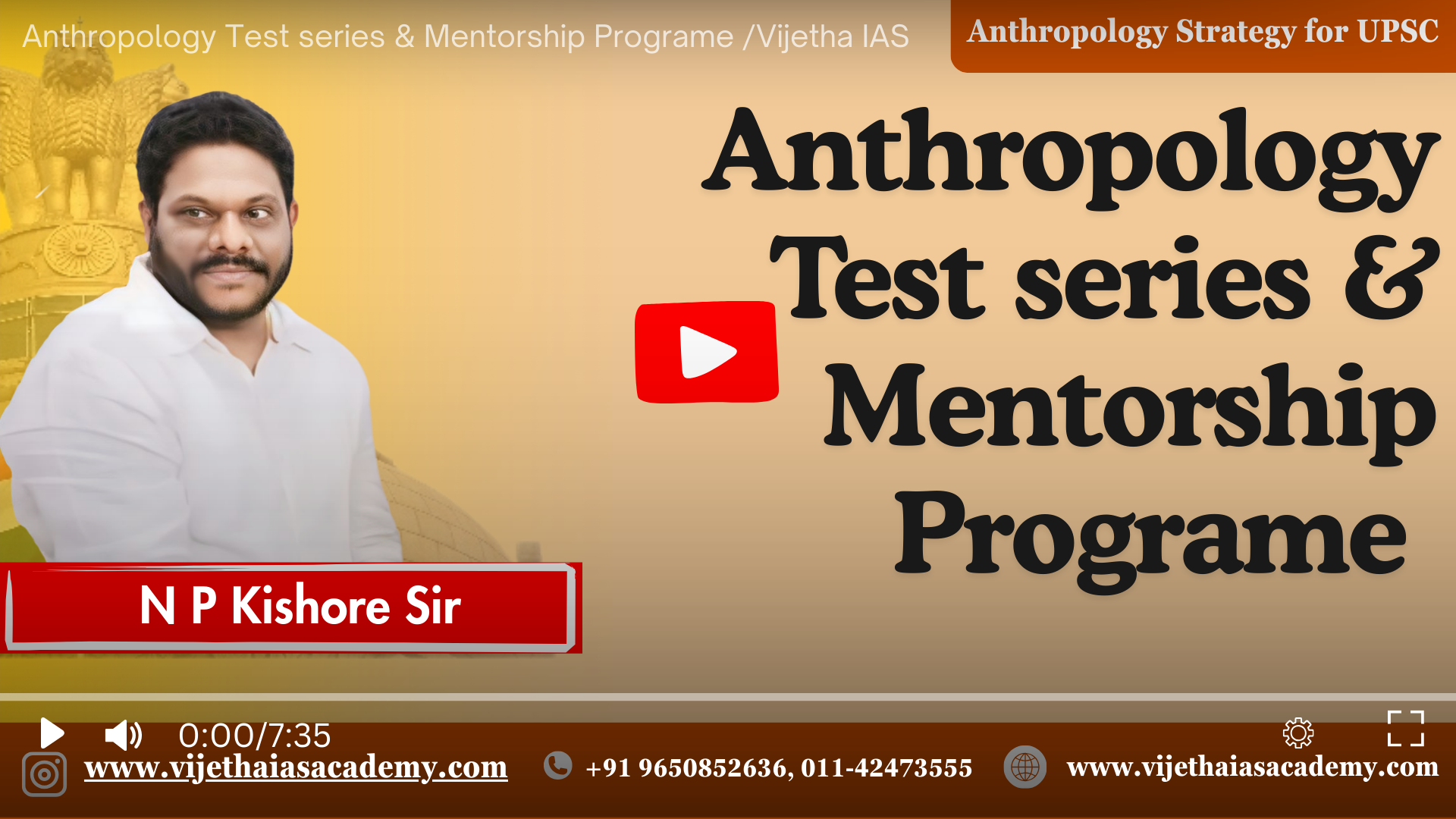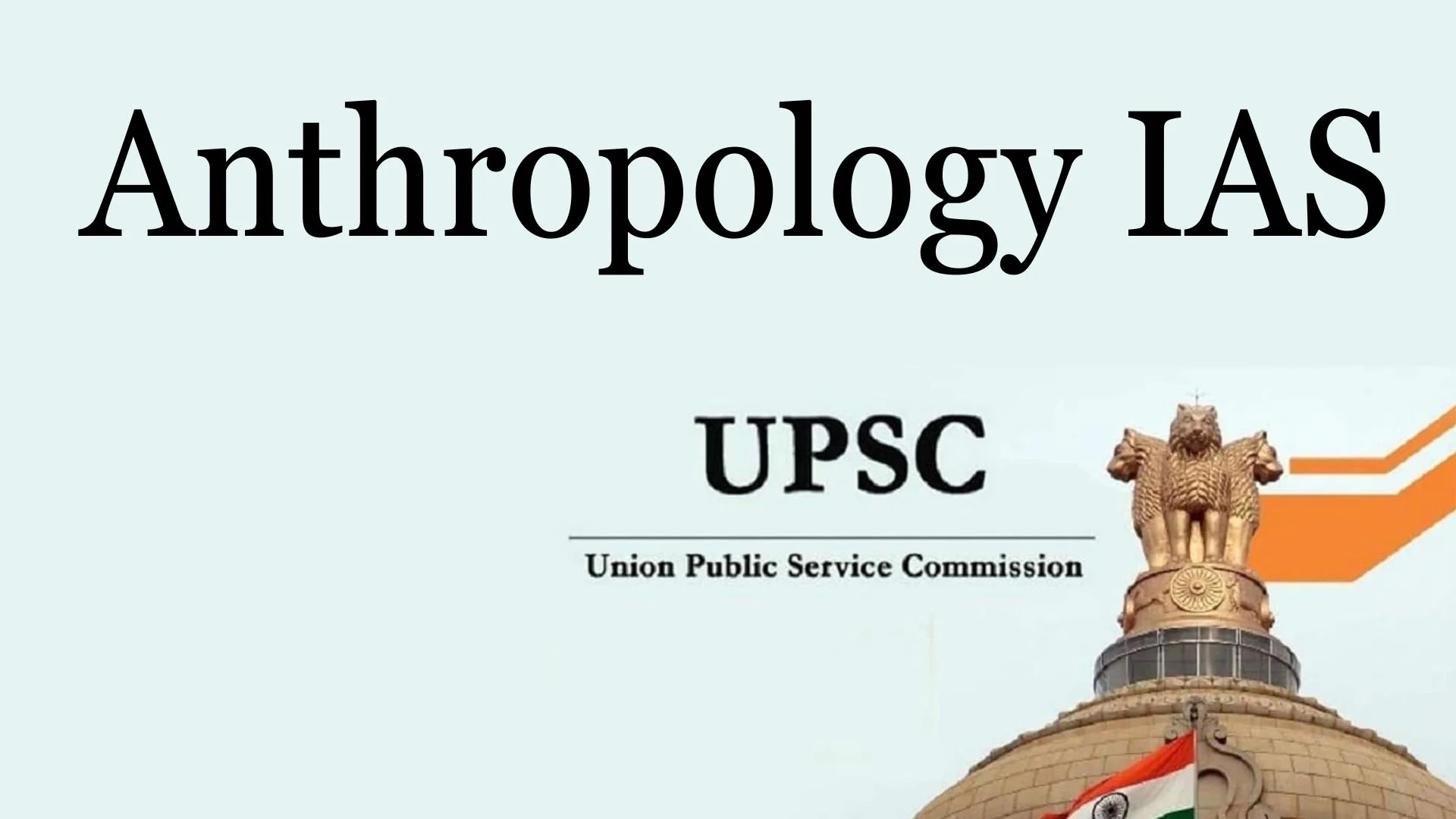
Anthropology IAS | Top Anthropology Optional Coaching | Vijetha IAS Academy |
Anthropology IAS: The Ultimate Guide for UPSC Aspirants in 2024
Anthropology IAS as an Optional Subject for the UPSC Civil Services Exam (CSE) has gained significant popularity due to its well-defined syllabus, interesting concepts, and relatively shorter syllabus compared to other subjects. If you are considering Anthropology as your optional subject for the UPSC exam in Anthropology IAS, here's a brief guide to help you understand its significance and how to approach your preparation
What is Anthropology in UPSC?
Anthropology is the study of humans, their evolution, societal structures, and cultural practices. As an optional subject in the UPSC Civil Services Examination (CSE), it has gained immense popularity among aspirants due to its scoring nature and structured syllabus. Anthropology is divided into two papers: Paper 1 (Physical Anthropology) and Paper 2 (Indian Anthropology). Both of these papers offer a blend of theoretical concepts and practical case studies, making them highly relevant for the exam.
Importance of Anthropology IAS in UPSC
Role of Anthropology in Mains and Prelims
In the UPSC Mains, Anthropology IAS is a popular subject, primarily due to its concise syllabus and theoretical nature, which allows candidates to prepare well within a limited timeframe. The subject also provides a deep understanding of human societies, which aligns with the general studies syllabus, especially in the areas of Indian society and social issues.
In the Prelims exam, Anthropology is a scoring subject for candidates who prefer a scientific approach to their preparation. The conceptual nature of the syllabus allows candidates to answer factual questions with precision, making it a significant component of the General Studies Paper 2.
Why Choose Anthropology IAS as an Optional Subject?
Understanding the Relevance of Anthropology IAS for UPSC
Anthropology has multiple advantages that make it a preferred choice for UPSC aspirants:
- Concise Syllabus
- Scoring Potential
- Linkage to General Studies
- Practical Case Studies
Overview of Anthropology IAS Syllabus
Paper 1: Physical Anthropology
Paper 1 covers physical anthropology, which focuses on human evolution, genetics, and the study of human remains. Key areas include:
- Evolution of humans
- Genetic inheritance
- Primates and their relevance to human evolution
- Human skeletal remains
This paper provides insights into the biological aspects of anthropology, which are scientific and rooted in factual analysis, making it highly relevant to the examination pattern.
Paper 2: Indian Anthropology
Paper 2 deals with Indian anthropology, focusing on tribes, social structures, and cultural anthropology. Key areas include:
- Tribal communities in India
- Impact of modernization on tribal societies
- Evolution of Indian society
- Sociocultural dynamics in India
This paper connects anthropology to Indian society and culture, providing candidates with a deep understanding of India's indigenous communities and their social dynamics.
Best Coaching for Anthropology IAS Preparation
While self-study is an option, many aspirants opt for coaching to streamline their preparation. At Vijetha IAS Academy, students receive specialized guidance under the mentorship of NP Kishore Sir, a renowned expert in Anthropology with a strong academic and UPSC background. Coaching helps in clearing doubts, understanding complex topics, and refining answer-writing skills.
Study Strategy for Anthropology IAS Time Management and Study Plan
A well-structured study plan is essential for mastering Anthropology. An ideal plan should allocate time for:
- Conceptual Understanding: Devote time to learning the basics of physical and Indian anthropology.
- Answer Writing: Practice writing answers to refine your writing style and improve speed.
- Revision: Regular revision ensures retention and better performance in the exam.
Anthropology IAS Test Series and Mock Tests
Test series and mock tests play an essential role in identifying your strengths and weaknesses. These help improve your time management and answer-writing skills, making you exam-ready. Institutes like Vijetha IAS Academy provide tailored test series for anthropology, focusing on the latest exam trends and patterns.
Final Tips for Anthropology IAS Success
- Stay Updated: Keep abreast of current issues related to tribes, social issues, and anthropology-related topics.
- Use Visual Aids: Diagrams, charts, and illustrations can make your answers stand out.
- Regular Revision: Revisit key concepts and theories periodically to stay on top of the subject.
Fees Structure (Anthropology IAS classroom) of Vijetha IAS Academy
For more information on our courses, visit our Anthropology Courses page. Explore our Test Series and Online Courses for flexible learning options.
we mention all the courses and their fees at Vijetha IAS Academy so that each and every IAS aspirant before joining Vijetha IAS Academy Anthropology Optional IAS Coaching Delhi they get full details of fees. In this table, we provide all the Anthropology Optional information about fee structure of Vijetha IAS Academy Anthropology Optional IAS Coaching in Delhi.
Vijetha IAS Academy Anthropology Optional
Vijetha IAS Academy is an extremely experienced and reputed Anthropology Optional Coaching Institute in Delhi which gives the best results in past years. In Delhi, Vijetha IAS Academy is the Top educational foundation for all IAS students because of its repeatability and best infrastructure.
Facilities of Vijetha IAS Academy Anthropology Optional
- Experienced and Qualified Faculties for better preparation of Anthropology Optional Course.
- Officials and Bureaucrats likewise educate in Vijetha IAS Academy Anthropology Optional
- Dedicated Research and Development Team in Delhi for better preparation of the Anthropology Optional Examination in Delhi.
- Creative Model of Preparation for Anthropology Optional IAS Coaching in Delhi.
- 3 Year validity of Tier 1 Classroom Programme and 2 years validity of Tier 1 Test series programme.
Frequently Asked Questions (FAQs)
1. How difficult is Anthropology IAS for UPSC?
Anthropology is considered one of the more manageable optional subjects for UPSC due to its structured syllabus and scientific approach. With dedicated preparation, it can be highly scoring.
2. Can Anthropology be prepared in 3 months for UPSC?
Yes, with an intense and focused preparation strategy, Anthropology can be covered in 3 months. Prioritize important topics, practice case studies, and revise regularly.
3. Is coaching necessary for Anthropology?
While self-study is an option, coaching can provide expert guidance and a structured approach to preparation. Institutes like Vijetha IAS Academy offer valuable mentorship under NP Kishore Sir.
4. How important are case studies in Anthropology?
Case studies are critical for Paper 2, especially for understanding the cultural and social aspects of anthropology. Regular practice can significantly improve your answer quality.
Conclusion
Anthropology IAS as an optional subject for the UPSC exam can be a rewarding choice if approached with the right strategy and dedication. With a focused approach, the right resources, and regular practice, you can excel in Anthropology and boost your overall UPSC preparation.
For the best guidance and resources on Anthropology for UPSC, Vijetha IAS Academy is one of the top institutions offering comprehensive coaching, mentorship, and test series for anthropology aspirants.
For more information on our courses, visit our Anthropology Courses page. Explore our Test Series and Online Courses for flexible learning options.
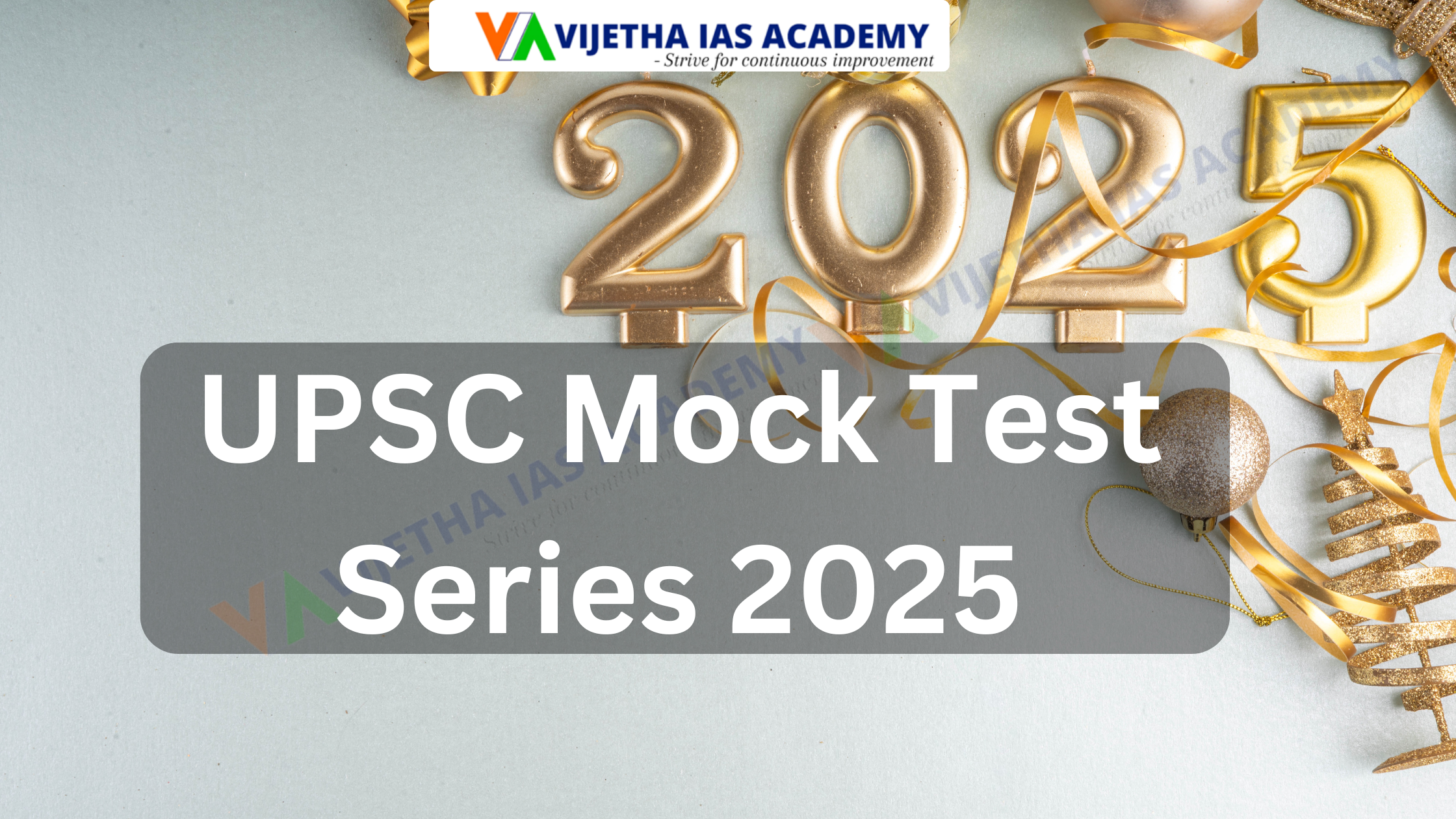
UPSC Mock Test Series 2025 | Test Series UPSC 2025 | N P Kishore Sir
UPSC Mock Test Series 2025: Your Ultimate Preparation Strategy
UPSC Mock Test Series 2025 is a vital tool for any candidate hoping in the UPSC Civil Services Examination (CSE). A strategic preparation tool for bettering time management, accuracy, and question-solving skills is the UPSC Mock Test Series 2025. A mock test series can greatly increase your chances of success when paired with excellent advice, like that provided by Vijetha IAS Academy.
By simulating the actual exam setting, mock exams help students assess their performance and improve their preparation. It is imperative to incorporate a mock test series into your study schedule as soon as possible, as the 2025 UPSC exam draws near. Mock tests are a vital tool for any candidate hoping to excel in the UPSC Civil Services Examination (CSE).
Why is a Mock Test Series Important for UPSC 2025?
A well-structured UPSC Mock Test Series plays an indispensable role in your preparation journey. Here's why:
- Familiarity with Exam Patterns
- Time Management Skills
- Self-Assessment and Progress Tracking
- Building Confidence
Key Benefits of UPSC Mock Test Series 2025
-
Enhanced Revision: Mock tests provide a structured way to revisit your notes and the topics you've studied. By facing a variety of questions, you revise important areas without monotony.
-
Adaptive Learning: By reviewing your mistakes after each mock test, you create a personalized roadmap to success. This adaptive learning approach ensures that you don't repeat the same errors during the actual UPSC exam.
-
Strengthened Answer Writing: Answer writing is a crucial aspect of UPSC Mains. By practicing tests through the UPSC Mock Test Series, you’ll refine your ability to present well-structured, insightful answers in the stipulated time.
How to Choose the Best UPSC Mock Test Series 2025
Selecting the right mock test series is key to maximizing your UPSC preparation. Here are some factors to consider:
1. Reputed Institute
Ensure that the mock test series is offered by a reputed coaching institute with proven results. Vijetha IAS Academy, known for its focus on the Anthropology Optional, offers a well-curated test series designed to challenge aspirants and prepare them thoroughly for the exam. The expertise of Kishore sir in Anthropology further enhances the quality of the tests.
2. Comprehensive Coverage
A good test series should cover all parts of the syllabus, including both Prelims and Mains. It must include General Studies, Optional subjects, and current affairs-based questions to ensure holistic preparation.
3. Quality of Questions
The quality of questions is paramount. Look for a mock test series that incorporates past-year questions along with high-level questions that challenge your understanding. The Anthropology case studies provided by Vijetha IAS Academy in their test series help aspirants gain valuable insights into complex topics.
4. Detailed Solutions and Feedback
Opt for a test series that provides not just the correct answers but also detailed solutions and explanations. At Vijetha IAS Academy, the feedback from each test is constructive and designed to help you improve progressively.
Why Choose Vijetha IAS Academy for UPSC Mock Test Series 2025?
When it comes to excelling in the UPSC, choosing the right institute is as important as the test series itself. Vijetha IAS Academy has a stellar reputation for mentoring students, especially in Anthropology. Here’s why their test series stands out:
-
Expert Faculty: With Kishore sir heading the Anthropology department, aspirants get access to high-quality questions, case studies, and expert guidance, making the test series exceptionally useful.
-
Strategically Designed Tests: The tests are structured to progressively increase in difficulty, ensuring that students are well-prepared for every level of the UPSC exam.
-
Real-Time Simulation: By participating in Vijetha’s UPSC Mock Test Series, you simulate the exam environment. This helps in reducing exam anxiety and builds the mental resilience necessary to face the actual UPSC CSE.
How to Make the Most of the UPSC Mock Test Series 2025?
- Start Early
- Analyze Results
- Revision through Tests
- Consistency is Key
- Incorporate Feedback
Conclusion
A UPSC Mock Test Series is one of the most critical components of an aspirant’s success strategy for the 2025 exam. By choosing a well-structured series from a reputed institute like Vijetha IAS Academy, you ensure comprehensive preparation that addresses all aspects of the UPSC exam, including the Anthropology Optional.
Anthropology Test Series Programme (Online + Offline))
We provide Anthropology Daily Answer Writing a range of programs designed to cater to various stages of UPSC preparation. Whether you're just starting out, have attempted the Mains before, or are getting ready for Mains 2025, we have the right option for you. Allow us to assist you in choosing the course that best fits your needs.
|
Level of Preparation |
Test Series Program |
Test Series Content |
Test Schedule |
|
Self-study of Anthropology Optional |
Anthropology 100 Days Personal Mentorship Program |
Daily answer writing, 34 sectional tests, 6 comprehensive tests, and complementary Mains Special 12 tests (between prelims and mains) |
|
|
Revise the whole syllabus through Daily Answer Writing Practice and Tests |
Anthropology DAW Mentorship Program |
Daily Answer Writing Practice and 8 sectional and 4 Full-Length tests |
|
|
Revise the whole syllabus through Sectional and Full Length Tests |
Anthropology Tier- I T-40 Test Series |
34 Sectionals and 6 Full-Length Tests |
|
|
Written Mains earlier and need more practice |
16-Anthropology Tier II Test Series |
10 sectional and 6 Full-Length Tests. |
|
|
Cleared Prelims 2023 and are preparing for Mains 2023 |
Mains Special 12 Tests program |
8 Sectional and 4 Full-Length Tests |
ANTHROPOLOGY MAINS SPECIAL COURSES
Enroll in our Anthropology Mentorship Program today and take the first step towards achieving your UPSC goals!
1) If you are going for a Self-study of Anthropology Optional and looking for a Comprehensive Program that includes Daily Answer Writing, 34 Sectional tests, 6 Comprehensive tests, and Complementary mains special 12 tests (between prelims and mains), our Anthropology 100 Days Personal Mentorship Program is the perfect choice.
2) If you want to revise the Whole Syllabus through Daily Answer Writing Practice and 8 sectional and 4 full-length tests, then our Anthropology DAW Mentorship Program is the best fit for you.
3) If you want to revise the Whole Syllabus through 34 Sectionals and 6 Full-Length Tests then the Anthropology Tier- I T-40 Test Series is for you.
4) If you have written Mains earlier and need more practice, then our 16-Anthropology Tier II Test Series is a great option. This test series includes 10 sectional and 6 full-length tests.
5) if you have cleared Prelims 2025 and are preparing for Mains 2025, our Mains Special 12 Tests program is a must-have. This program includes 8 sectional and 4 full-length tests to help you prepare for the big day.
For more information on Vijetha IAS Academy’s Anthropology mentorship programs Details: https://vijethaiasacademy.com/anthropology-test-series
Anthropology 100 Days Personal Mentorship Program ( 7 + 3 Times Revision )
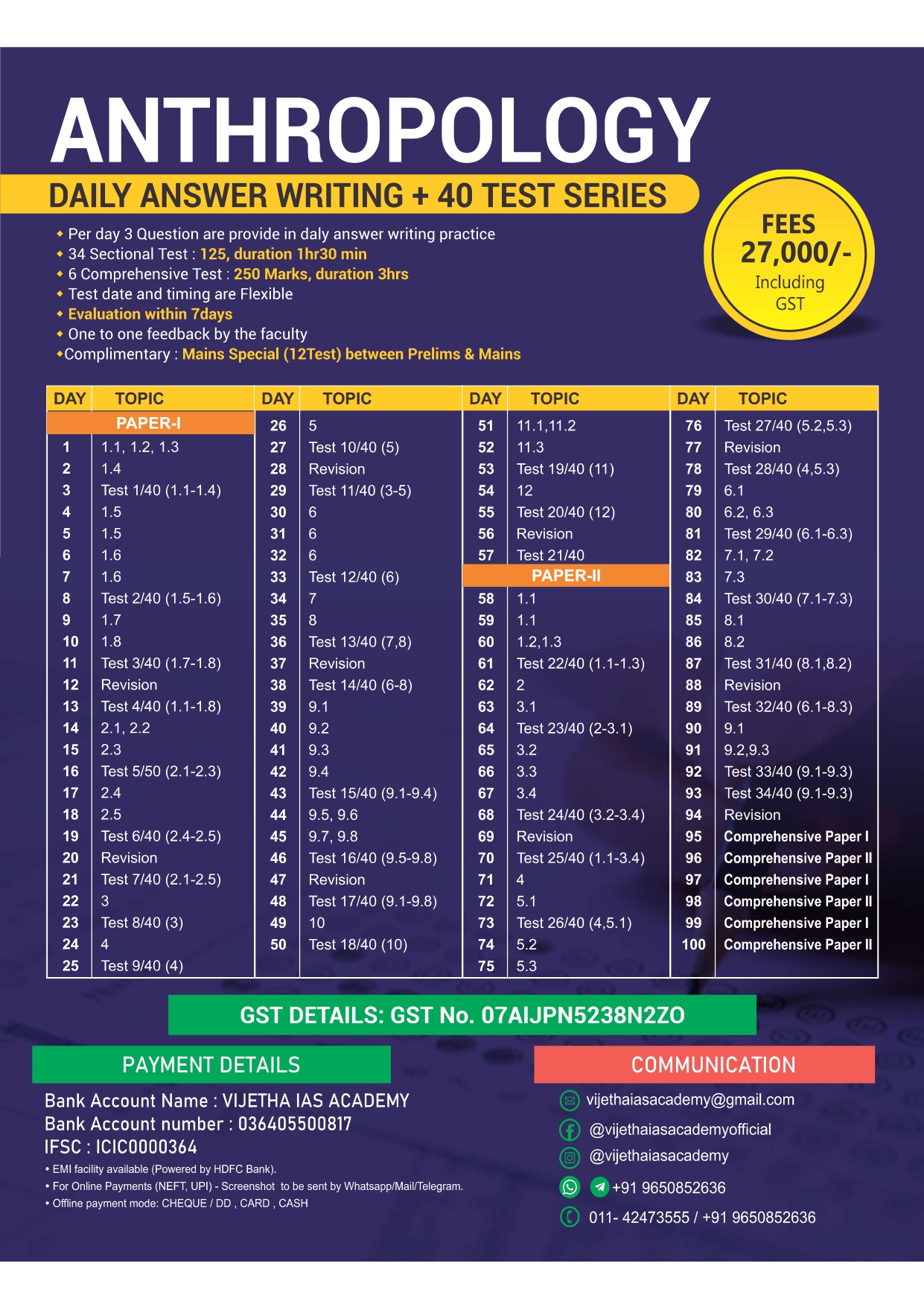
Anthropology 60 Days Personal Mentorship Program ( 4 + 3 Times Revision )
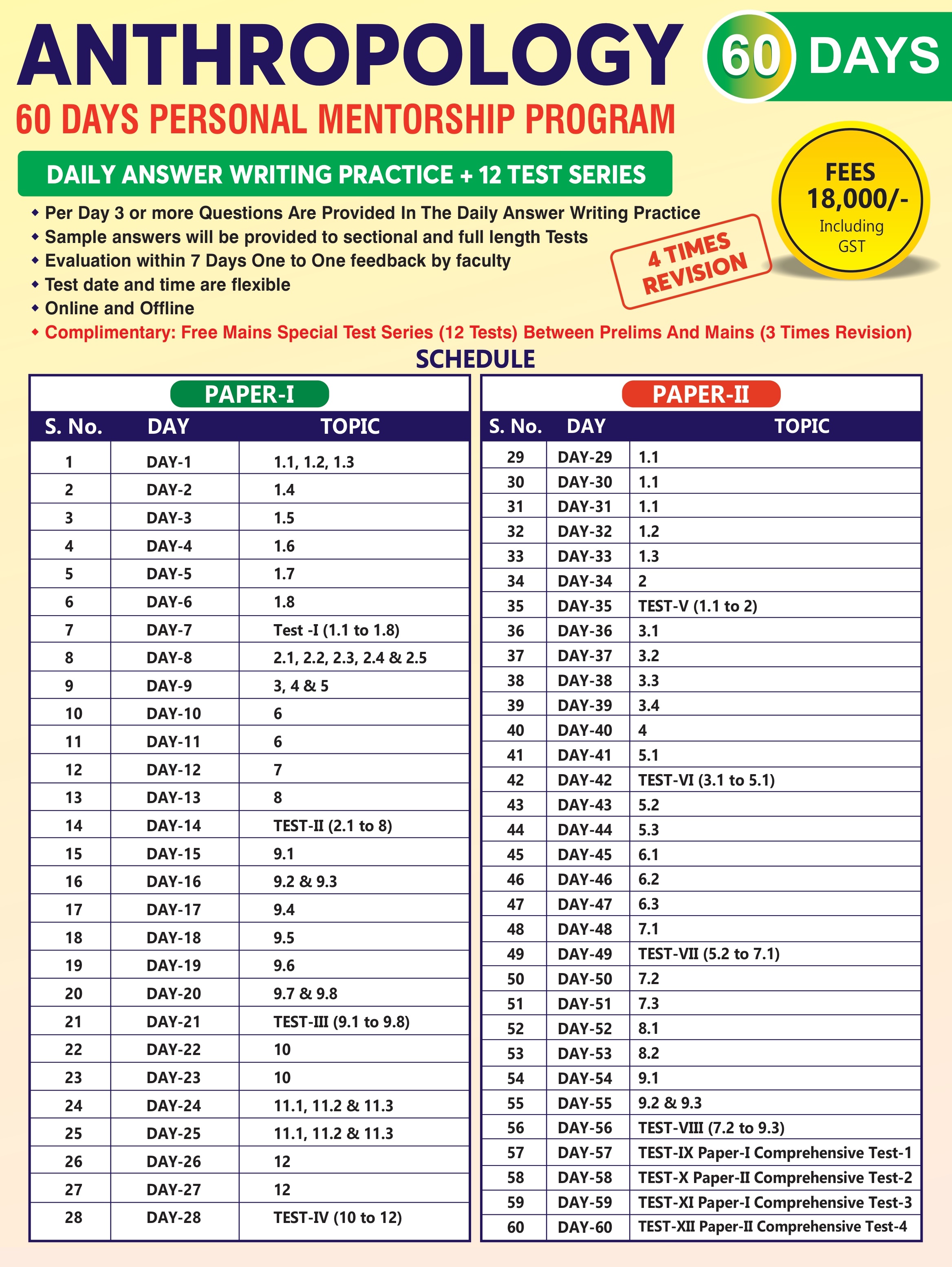
FAQs UPSC Test Series 2025
-
What is the best time to start a test series for IAS?
It's ideal to start a test series From Vijetha IAS Academyearly in your preparation, at least 8-12 months before the exam, so you have ample time for improvement. -
How does the test series help in UPSC Mains preparation?
A test series from Vijetha IAS Academy helps improve answer writing, time management, and provides a real-exam experience that is crucial for Mains preparation. -
Is Anthropology Optional scoring in IAS?
Yes, Anthropology is considered one of the most scoring optional subjects, provided it is prepared well through resources like Vijetha IAS Academy’s test series. -
Can I take a test series online?
Absolutely! Vijetha IAS Academy offers a flexible online test series form Vijetha IAS Academy, which you can take from anywhere at your convenience. -
How do I improve my time management for the IAS exam?
Regular practice through a test series can significantly improve your time management skills by Vijetha IAS Academy simulating the actual exam environment.
For more information: https://vijethaiasacademy.com/anthropology-test-series
Vijetha IAS Academy
Add. 2nd Floor, 7/50, Shankar Road, Block 7, Old Rajinder Nagar, Delhi 110060
MOB. 096508 52636
Open 7 Am : Closes 9 PM
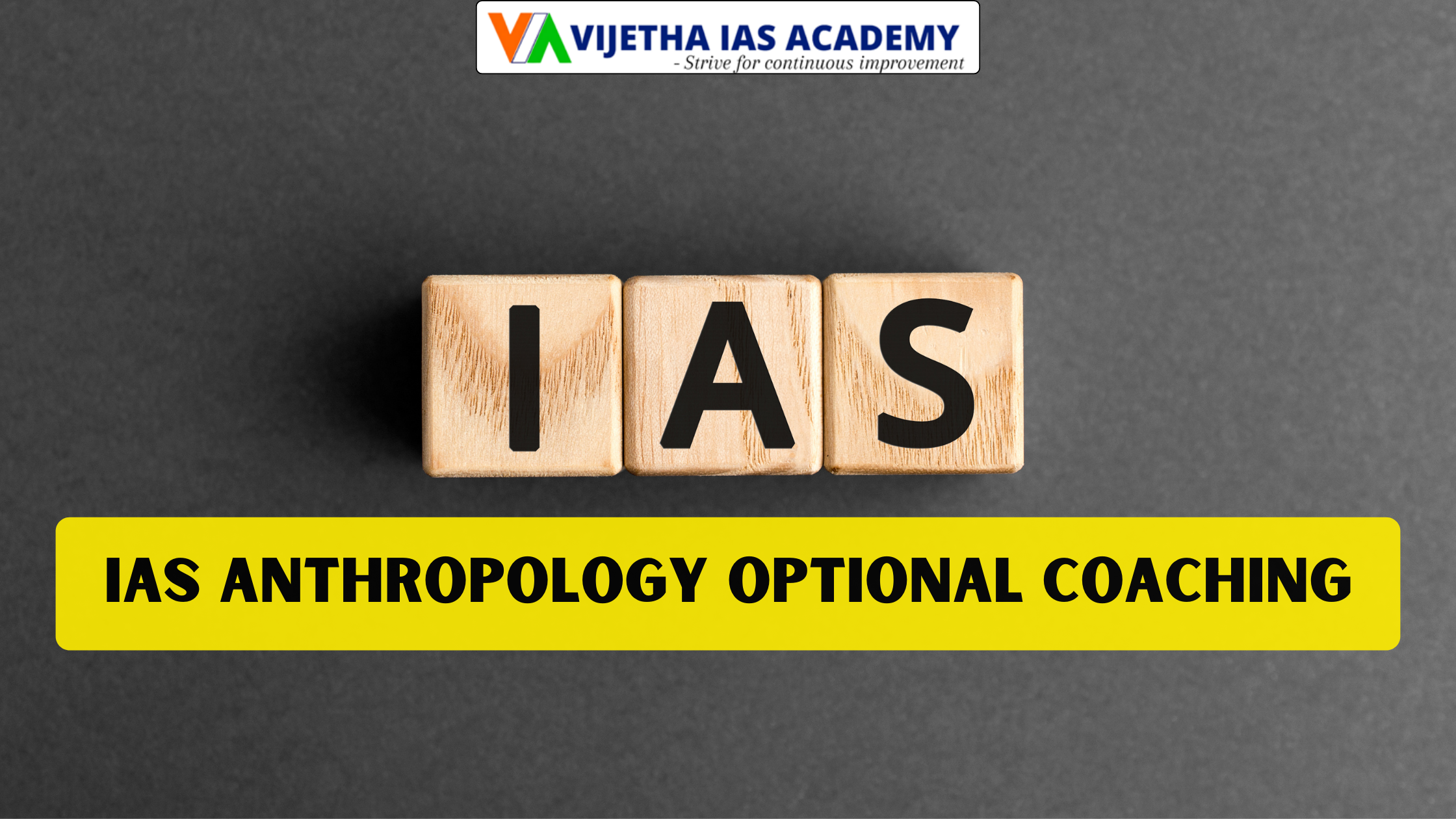
Ias Anthropology Optional Coaching | Vijetha IAS Academy
IAS Anthropology Optional Coaching
Your performance on the UPSC Civil Services Exam will depend on the optional topic you select. One of the most well-liked and esteemed disciplines among applicants is anthropology, and many candidates have benefited from Vijetha IAS Academy's student-centered approach of teaching anthropology optionally. Along with many other subjects, this post will discuss IAS Anthropology Optional Coaching at Vijetha IAS Academy, the premier teaching facility in this region. We'll discuss the benefits of choosing Anthropology and how our coaching may help you achieve your goals.
Why Choose Anthropology Optional?
Anthropology is a dynamic and scoring subject in the UPSC syllabus. It covers the study of human evolution, culture, and society, making it both interesting and manageable for UPSC aspirants. Here's why it stands out:
- Concise Syllabus: The syllabus is compact and can be completed within a reasonable time frame, making it ideal for students with limited time.
- Interdisciplinary: Anthropology overlaps with other general studies subjects like history, geography, and sociology, providing a holistic understanding of human society.
- High Scoring Potential: Anthropology has a high success rate in the UPSC Mains examination, with many toppers opting for it.
- Straightforward Concepts: Anthropology deals with topics that are relatively easy to grasp, especially if you have a scientific or social science background.
At Vijetha IAS Academy, our Anthropology optional coaching provides a well-structured curriculum, regular test series, and personalized mentorship from Kishore Sir, making it the best choice for UPSC aspirants.
What Makes Vijetha IAS Academy the Best for Anthropology Optional Coaching?
Vijetha IAS Academy has a proven track record of helping students excel in Anthropology optional. Here’s what makes us stand out:
1. Expert Faculty: Kishore Sir
Kishore Sir, with his double Masters from the UK and experience as a scientist, is a master of Anthropology Optional. He has firsthand experience with the UPSC exam and has mentored thousands of students, helping them navigate the complexities of the subject. His teaching approach emphasizes concept clarity, making difficult topics easy to understand. Kishore Sir's in-depth knowledge and unique insights are critical in helping students write effective answers and score high in the exams.
2. Comprehensive Study Material
Our study material is curated to cover the entire syllabus in a detailed yet concise manner. It includes anthropology case studies for UPSC, previous year questions, and model answers that give students a clear understanding of what to expect in the exam.
3. Regular Anthropology Optional Test Series
Our Anthropology Optional Test Series is designed to give students the edge they need in the UPSC Mains exam. We offer a structured schedule of mock tests, followed by detailed discussions and feedback sessions. These tests cover both Paper 1 and Paper 2 of Anthropology and ensure that students are fully prepared to tackle any question the UPSC might throw at them.
4. Personalized Mentorship
At Vijetha IAS Academy, we focus on providing personalized guidance to every student. Our mentorship program ensures that each student receives individual attention, feedback on their answers, and tailored strategies to maximize their scores.
5. Flexible Learning Options
We offer both online and offline classes for Anthropology Optional. Our online classes are highly interactive and provide the same level of engagement and guidance as our physical classes. This ensures that students across India can benefit from the best Anthropology Optional Coaching without location constraints.
Course Details at Vijetha IAS Academy
At Vijetha IAS Academy, we offer a variety of Anthropology courses to suit the needs of every aspirant:
- Anthropology Optional Foundation Course: Aimed at beginners, this course covers the entire syllabus from scratch, with special emphasis on concept clarity and answer writing.
- Anthropology Optional Crash Course: This course is ideal for those who have already studied Anthropology but need quick revision and test practice before the exams.
- Anthropology Test Series 2025: Our test series is structured to provide comprehensive practice through sectional tests and full-length mocks, helping students master time management and answer writing.
Enroll now in our courses by visiting Anthropology Optional Courses and start your journey toward success in UPSC!
The Advantages of Joining Vijetha IAS Academy
- Proven Success: Our students consistently achieve high scores in the Anthropology Optional exam. We have mentored 100,000+ students over the years, making us a leader in Anthropology coaching.
- Structured Curriculum: Our well-planned syllabus ensures timely completion and thorough revision of all topics.
- Student-Centric Approach: We have a dedicated support team that addresses students' doubts and offers continuous guidance.
- High-Quality Resources: Our study material includes anthropology case studies for UPSC, model answers, and key topics relevant for the UPSC syllabus.
Conclusion
If you are looking for IAS Anthropology Optional Coaching, Vijetha IAS Academy should be your top choice. With our student-centric approach, expert faculty like Kishore Sir, and comprehensive Anthropology Test Series, we offer the best guidance to help you succeed in the UPSC examination.
Don't wait! Join the best Anthropology Optional Coaching today and begin your UPSC preparation with Vijetha IAS Academy.
For more details, visit Vijetha IAS Academy Anthropology Courses and kick-start your UPSC journey now!
Contact Details and Address
Top Anthropology Optional IAS Coaching Center in Delhi Vijetha IAS Academy | Best Anthropology Optional IAS Coaching in Delhi
Address: 2nd Floor, 50, Shankar Road, Block 7, Old Rajinder Nagar, Rajinder Nagar, New Delhi, Delhi 110060 Contact Number: +91 9650852636
Fee Structure:
- Tier 1: Rs. 55,150/- (3 Years Validity of Offline/Live Batch)
- Tier 2: Rs. 42,000/-
- Tier 3: Rs. 36,000/-
Batch Size: 50 – 60 Students
UPSC Notes
Anthropology Optional IAS Coaching Notes, IAS Exam Preparation Booklets, IAS optional coaching Notes, UPSC Coaching Notes, Video Lectures, Live Classes with faculty, Chat Facility Available
Teachers Name: N P Kishore Sir
Past Result
- Last Years Result 2023
- 35 Total Selections in CSE 2023
Google Reviews: 4.9 out of 5 stars
Website: Vijetha Anthropology Optional IAS Coaching in Delhi (https://vijethaiasacademy.com)
Faculties of Vijetha IAS Academy
- N P Kishore Sir
Features
- Vijetha IAS Academy offers Online and offline Courses for better preparation of Anthropology Optional Strategy for UPSC in Delhi.
- For better Anthropology optional Exam Preparation, Vijetha IAS Academy Delhi Conducts the Motivational IAS Session.
- Vijetha IAS Academy provides you with the CASE STUDIES on the pattern of the real-time IAS Exam which is helpful for better preparation of the Best Coaching for UPSC Anthropology Optional Optional IAS Examination.
- DAW & WAW – Revision Through Daily & Weekly Answer Writing Practice is offered by Vijetha IAS Academy for better result of the Anthropology Optional IAS examination.
Advantages of joining Vijetha IAS Academy
- Best Faculties for Anthropology Optional IAS Coaching in Delhi
- Best facilities, infrastructure and updated Case Studies Booklets and Notes for better preparation of the Anthropology Optional IAS Examination in Delhi.
- Best result in Past years for Anthropology Optional Strategy for UPSC Examination in Delhi
- Best Rated coaching institute for Anthropology Optional IAS Examination in Delhi.
- Vijetha IAS Academy also provides recorded lectures videos, notes which is very helpful for better preparation of Anthropology Optional IAS Coaching in Delhi
Fees Structure (Anthropology classroom) of Vijetha IAS Academy
Fees Structure (General Studies) of Vijetha IAS Academy
|
Course Name |
Fees Amount |
Course Duration |
|
GS Offline (Pre + Mains+ CSAT) with Essay+Answer Writing |
Rs.99,000 (Including GST) |
400+ Days |
|
GS Online |
Rs.18,999 (Including GST) |
400+ Days |
|
GS Mentorship Programme |
Rs.29,999 (Including GST) |
1 Year |
we mention all the courses and their fees at Vijetha IAS Academy so that each and every IAS aspirant before joining Vijetha IAS Academy Anthropology Optional IAS Coaching Delhi they get full details of fees. In this table, we provide all the Anthropology Optional information about fee structure of Vijetha IAS Academy Anthropology Optional IAS Coaching in Delhi.
Vijetha IAS Academy Anthropology Optional
Vijetha IAS Academy is an extremely experienced and reputed Anthropology Optional Coaching Institute in Delhi which gives the best results in past years. In Delhi, Vijetha IAS Academy is the Top educational foundation for all IAS students because of its repeatability and best infrastructure.
Facilities of Vijetha IAS Academy Anthropology Optional
- Experienced and Qualified Faculties for better preparation of Anthropology Optional Course.
- Officials and Bureaucrats likewise educate in Vijetha IAS Academy Anthropology Optional
- Dedicated Research and Development Team in Delhi for better preparation of the Anthropology Optional Examination in Delhi.
- Creative Model of Preparation for Anthropology Optional IAS Coaching in Delhi.
- 3 Year validity of Tier 1 Classroom Programme and 2 years validity of Tier 1 Test series programme.
Frequently Asked Questions on Anthropology Optional
Q) Why Vijetha IAS Academy is Anthropology Optional Coaching in Delhi?
Ans – Due to its excellent facilities and prime location, Vijetha IAS Academy is regarded as the top Anthropology Optional IAS Coaching in Delhi. The academy provides both in-person and online classes, catering to the needs of all IAS aspirants..
Read more Article:- Best Anthropology Coaching in Delhi
Q) How is Vijetha IAS Academy Anthropology Optional Coaching in Delhi, India?
Ans – Vijetha IAS Academy is considered the leading coaching center for Anthropology Optional in Delhi. Their expert faculties has made it easier for students to prepare for the UPSC exam, especially those choosing Vijetha IAS Academy for their optional subject in 2024.
Q) What is the ranking of Vijetha Anthropology Optional Coaching in Delhi?
Ans – Vijetha IAS Academy is the rank 1 Best Anthropology Optional IAS Coaching in Delhi IAS Exam preparation.
Q) Why to choose Vijetha IAS Academy Anthropology Optional Coaching in Delhi, India?
Ans – Vijetha IAS Academy has the best Anthropology Optional faculty in India and their fees is quite nominal.
Q) Which is the Cheapest and Affordable Anthropology Optional Coaching in Delhi?
Ans: Vijetha IAS Academy is the most affordable Anthropology Optional IAS Coaching in Delhi. It stands out as one of the top institutes for Anthropology Optional, offering excellent IAS exam preparation facilities and expert faculty. By joining Vijetha IAS Academy, you can effectively prepare for both the IAS Prelims and Mains examinations, making it a budget-friendly option for Anthropology Optional coaching in Delhi.
Q) Is Anthropology a good optional for UPSC?
Yes, Anthropology is a good optional due to its concise syllabus, objective nature, and overlap with General Studies. It has a high scoring potential if studied well.
Q) Can non-science students opt for Anthropology?
Yes, students from any background can opt for Anthropology. It doesn't require prior knowledge, making it a popular choice among aspirants.
Q) How long does it take to complete the Anthropology syllabus?
With focused preparation, the Anthropology syllabus can be completed in 4-6 months. Regular revisions and practice tests are important for reinforcement.
Q) How can I improve my answer writing in Anthropology?
Joining test series, practicing diagrams, and incorporating case studies will significantly improve your answer writing. Vijetha IAS Academy offers dedicated test series for Anthropology.
Q) Where can I get the best Anthropology coaching for UPSC?
Vijetha IAS Academy is known for its specialized Anthropology courses, expert faculty, and extensive resources tailored to help aspirants succeed.
Vijetha IAS Academy
Add. 2nd Floor, 50, Shankar Road, Block 7, Old Rajinder Nagar, Rajinder Nagar, New Delhi, Delhi 110060
MOB. 096508 52636
Open 7 Am : Closes 9 PM

Write notes on Constitutional Safeguards for Backward Classes about 150 words (10 Marks) Anthropology Optional Paper CSE 2024
Write notes on Constitutional Safeguards for Backward Classes of about 150 words
(10 Marks) Anthropology Optional Paper CSE 2024
Introduction
The Constitution of India provides several safeguards for the Backward Classes, including Scheduled Castes (SCs), Scheduled Tribes (STs), and Other Backward Classes (OBCs). These safeguards aim to promote social, economic, and political justice for communities that have historically faced discrimination and marginalization. Through various constitutional provisions, the state seeks to uplift these groups by ensuring equal opportunities, representation, and protection of rights.
Main Body
Article 15(4): This empowers the state to make special provisions for the advancement of socially and educationally backward classes, SCs, and STs, enabling affirmative action like reservations in educational institutions.
Article 16(4): It allows for reservations in public employment for backward classes if the state determines they are underrepresented in government services, promoting equality in job opportunities.
Article 46: The Directive Principles of State Policy mandate the state to promote the educational and economic interests of SCs, STs, and other weaker sections, and to protect them from social injustice and exploitation.
Article 338 and 338A: These establish the National Commissions for Scheduled Castes and Scheduled Tribes, respectively, ensuring constitutional oversight of the implementation of safeguards and rights for these communities.
Article 340: Provides for the appointment of a commission to investigate the conditions of socially and educationally backward classes and make recommendations for their upliftment.
Scheduled Castes and Scheduled Tribes (Prevention of Atrocities) Act, 1989: This law provides additional protection from discrimination and atrocities faced by SCs and STs.
Conclusion
The constitutional safeguards for backward classes reflect India's commitment to social justice and equality. Through a combination of affirmative action, legal protection, and focused policies, these provisions aim to uplift marginalized communities and address historical injustices. While significant progress has been made, continued efforts are needed to ensure these constitutional safeguards are effectively implemented to achieve true equality and social inclusion.
Anthropology Test Series Programme (Online + Offline))
We provide Anthropology Daily Answer Writing a range of programs designed to cater to various stages of UPSC preparation. Whether you're just starting out, have attempted the Mains before, or are getting ready for Mains 2024, we have the right option for you. Allow us to assist you in choosing the course that best fits your needs.
|
Level of Preparation |
Test Series Program |
Test Series Content |
Test Schedule |
|
Self-study of Anthropology Optional |
Anthropology 100 Days Personal Mentorship Program |
Daily answer writing, 34 sectional tests, 6 comprehensive tests, and complementary Mains Special 12 tests (between prelims and mains) |
|
|
Revise whole syllabus through Daily Answer Writing Practice and Tests |
Anthropology DAW Mentorship Program |
Daily Answer Writing Practice and 8 sectional and 4 Full Length tests |
|
|
Revise whole syllabus through Sectional and Full Length Tests |
Anthropology Tier- I T-40 Test Series |
34 Sectionals and 6 Full Length Tests |
|
|
Written Mains earlier and need more practice |
16-Anthropology Tier II Test Series |
10 sectional and 6 Full-Length Tests. |
|
|
Cleared Prelims 2023 and are preparing for Mains 2023 |
Mains Special 12 Tests program |
8 Sectional and 4 Full-Length Tests |
ANTHROPOLOGY MAINS SPECIAL COURSES
Enroll in our Anthropology Mentorship Program today and take the first step towards achieving your UPSC goals!
1) If you are going for Self study of Anthropology Optional and looking for a Comprehensive Program that includes Daily Answer Writing, 34 Sectional tests, 6 Comprehensive tests, and Complementary mains special 12 tests (between prelims and mains), our Anthropology 100 Days Personal Mentorship Program is the perfect choice.
2) If you want to revise Whole Syllabus through Daily Answer Writing Practice and 8 sectional and 4 full length tests, then our Anthropology DAW Mentorship Program is the best fit for you.
3) If you want to revise Whole Syllabus through 34 Sectionals and 6 Full Length Tests then Anthropology Tier- I T-40 Test Series is for you.
4) If you have written Mains earlier and need more practice, then our 16-Anthropology Tier II Test Series is a great option. This test series includes 10 sectional and 6 full-length tests.
5) if you have cleared Prelims 2023 and are preparing for Mains 2023,our Mains Special 12 Tests program is a must-have. This program includes 8 sectional and 4 full-length tests to help you prepare for the big day.
For more information on Vijetha IAS Academy’s Anthropology mentorship programs Deatils : https://vijethaiasacademy.com/anthropology-test-series
Anthropology 100 Days Personal Mentorship Program ( 7 + 3 Times Revision )

Anthropology 60 Days Personal Mentorship Program ( 4 + 3 Times Revision )

For more information: https://vijethaiasacademy.com/anthropology-test-series
Details Of Anthropology Classes Program
Top Anthropology Optional IAS Coaching Center in Delhi Vijetha IAS Academy | Best Anthropology Optional IAS Coaching in Delhi
Fee Structure:
- Tier 1: Rs. 55,150/- (3 Years Validity of Offline/Live Batch)
- Tier 2: Rs. 42,000/-
- Tier 3: Rs. 36,000/-
Batch Size: 50 – 60 Students
UPSC Notes
Anthropology Optional IAS Coaching Notes, IAS Exam Preparation Booklets, IAS optional coaching Notes, UPSC Coaching Notes, Video Lectures, Live Classes with faculty, Chat Facility Available
Teachers Name: N P Kishore Sir
Past Result
- Last Years Result 2023
- 35 Total Selections in CSE 2023
Google Reviews: 4.9 out of 5 stars
Website: Vijetha Anthropology Optional IAS Coaching in Delhi (https://vijethaiasacademy.com)
Faculties of Vijetha IAS Academy
- N P Kishore Sir
Features
- Vijetha IAS Academy offers Online and offline Courses for better preparation of Anthropology Optional Strategy for UPSC in Delhi.
- For better Anthropology optional Exam Preparation, Vijetha IAS Academy Delhi Conducts the Motivational IAS Session.
- Vijetha IAS Academy provides you with the CASE STUDIES on the pattern of the real-time IAS Exam which is helpful for better preparation of the Best Coaching for UPSC Anthropology Optional Optional IAS Examination.
- DAW & WAW – Revision Through Daily & Weekly Answer Writing Practice is offered by Vijetha IAS Academy for better result of the Anthropology Optional IAS examination.
Advantages of joining Vijetha IAS Academy
- Best Faculties for Anthropology Optional IAS Coaching in Delhi
- Best facilities, infrastructure and updated Case Studies Booklets and Notes for better preparation of the Anthropology Optional IAS Examination in Delhi.
- Best result in Past years for Anthropology Optional Strategy for UPSC Examination in Delhi
- Best Rated coaching institute for Anthropology Optional IAS Examination in Delhi.
- Vijetha IAS Academy also provides recorded lectures videos, notes which is very helpful for better preparation of Anthropology Optional IAS Coaching in Delhi
Fees Structure of Vijetha IAS Academy
|
Tier 2 |
Tier 1 |
Tier 3 |
BATCH STARTS FROM |
|
42,000/- |
55,150/- (3 Years Validity Offline/Live Batch) |
36,000/- |
REGISTRATION – START |
Fees Structure of Vijetha IAS Academy
|
Course Name |
Fees Amount |
Course Duration |
|
GS Offline (Pre + Mains+ CSAT) with Essay+Answer Writing |
Rs.99,000 (Including GST) |
400+ Days |
|
GS Online |
Rs.18,999 (Including GST) |
400+ Days |
|
GS Mentorship Programme |
Rs.29,999 (Including GST) |
1 Year |
For more information on our courses, visit our Anthropology Courses page. Explore our Test Series and Online Courses for flexible learning options.
Vijetha IAS Academy
Add. 2nd Floor, 50, Shankar Road, Block 7, Old Rajinder Nagar, Rajinder Nagar, New Delhi, Delhi 110060
MOB. 096508 52636
Open 7 Am : Closes 9 PM
Keywords:
constitutional safeguards, backward classes, Article 15, Article 16, reservation policies, anthropology 2024 question paper, Anthropology optional subject question paper 2024, Anthropology optional 2024 question paper, Anthropology Optional Coaching UPSC, Vijetha IAS Academy Anthropology, Anthropology crash course UPSC, Anthropology daily answer writing UPSC, Kishore sir Anthropology

Elucidate the difference between secularism, religiosity, religious fundamentalism and spiritualism from an anthropological perspective. (15 Marks) Anthropology Optional Paper CSE 2024
Elucidate the difference between secularism, religiosity, religious fundamentalism and spiritualism from an anthropological perspective.
(15 Marks) Anthropology Optional Paper CSE 2024
Introduction
In anthropology, secularism, religiosity, religious fundamentalism, and spiritualism are critical concepts used to understand the varying relationships between individuals, society, and the divine or sacred. These terms reflect different cultural and social expressions of belief systems and practices. From an anthropological perspective, understanding these differences is essential for studying the role of religion and belief systems in shaping human behaviour, institutions, and social relations.
Main Body
Secularism:
Definition: Secularism refers to the separation of religion from the state and public affairs. It emphasizes that religious belief should not influence governmental decisions or policies.
Anthropological Perspective: Secularism is often viewed as a response to religious pluralism in modern societies, where the state seeks to maintain neutrality among diverse religious groups. In anthropology, secularism is studied as part of the process of modernization and social change, particularly in post-colonial and Western contexts. Secularism can manifest differently in various cultures, sometimes coexisting with strong religious identities.
Religiosity:
Definition: Religiosity refers to the extent and intensity of religious beliefs and practices in an individual's or community's life. It involves personal faith, adherence to religious norms, participation in rituals, and the expression of religious values.
Anthropological Perspective: Anthropologists study religiosity to understand how individuals and communities navigate their faith within broader social structures. Religiosity is culturally specific and varies widely depending on religious traditions, social institutions, and individual experiences. It also reflects how religion is integrated into daily life, shaping cultural identities, ethical systems, and social behavior.
Religious Fundamentalism:
Definition: Religious fundamentalism is a belief in the absolute authority of religious texts and doctrines. Fundamentalists seek to return to what they view as the original and pure form of their religion, often rejecting modern interpretations or secular influences.
Anthropological Perspective: Fundamentalism is studied as a reaction to globalization, secularization, and modernity. Anthropologists examine how fundamentalist movements often arise in response to perceived threats to religious identity and values. These movements tend to emphasize a strict interpretation of religious teachings, sometimes resulting in exclusionary practices or conflict with other social or religious groups. Fundamentalism can also be a form of cultural resistance against external influences that are seen as undermining traditional ways of life.
Spiritualism:
Definition: Spiritualism is a belief in the existence of spiritual forces or realms beyond the material world. It often emphasizes personal experiences with the divine or transcendent, without strict adherence to organized religious doctrines or institutions.
Anthropological Perspective: Spiritualism is understood as part of the individualization of belief systems in contemporary societies. Anthropologists study how spiritualism allows for personalized and flexible religious practices, often blending elements from different religions, philosophies, or new-age movements. It reflects a shift from institutionalized religion to more individualistic and subjective forms of faith, and is commonly associated with the quest for meaning, well-being, and self-transcendence in modern contexts.
Conclusion
From an anthropological perspective, the concepts of secularism, religiosity, religious fundamentalism, and spiritualism highlight the diversity and complexity of human engagement with religion and spirituality. Secularism underscores the separation of religion from governance, religiosity focuses on the personal and communal expression of faith, fundamentalism represents a rigid return to religious origins, and spiritualism reflects a more personal, often eclectic engagement with the divine. Understanding these concepts allows anthropologists to explore how different belief systems shape cultures, societies, and individual identities, while also influencing broader social and political dynamics.
Anthropology Test Series Programme (Online + Offline))
We provide Anthropology Daily Answer Writing a range of programs designed to cater to various stages of UPSC preparation. Whether you're just starting out, have attempted the Mains before, or are getting ready for Mains 2024, we have the right option for you. Allow us to assist you in choosing the course that best fits your needs.
|
Level of Preparation |
Test Series Program |
Test Series Content |
Test Schedule |
|
Self-study of Anthropology Optional |
Anthropology 100 Days Personal Mentorship Program |
Daily answer writing, 34 sectional tests, 6 comprehensive tests, and complementary Mains Special 12 tests (between prelims and mains) |
|
|
Revise whole syllabus through Daily Answer Writing Practice and Tests |
Anthropology DAW Mentorship Program |
Daily Answer Writing Practice and 8 sectional and 4 Full Length tests |
|
|
Revise whole syllabus through Sectional and Full Length Tests |
Anthropology Tier- I T-40 Test Series |
34 Sectionals and 6 Full Length Tests |
|
|
Written Mains earlier and need more practice |
16-Anthropology Tier II Test Series |
10 sectional and 6 Full-Length Tests. |
|
|
Cleared Prelims 2023 and are preparing for Mains 2023 |
Mains Special 12 Tests program |
8 Sectional and 4 Full-Length Tests |
ANTHROPOLOGY MAINS SPECIAL COURSES
Enroll in our Anthropology Mentorship Program today and take the first step towards achieving your UPSC goals!
1) If you are going for Self study of Anthropology Optional and looking for a Comprehensive Program that includes Daily Answer Writing, 34 Sectional tests, 6 Comprehensive tests, and Complementary mains special 12 tests (between prelims and mains), our Anthropology 100 Days Personal Mentorship Program is the perfect choice.
2) If you want to revise Whole Syllabus through Daily Answer Writing Practice and 8 sectional and 4 full length tests, then our Anthropology DAW Mentorship Program is the best fit for you.
3) If you want to revise Whole Syllabus through 34 Sectionals and 6 Full Length Tests then Anthropology Tier- I T-40 Test Series is for you.
4) If you have written Mains earlier and need more practice, then our 16-Anthropology Tier II Test Series is a great option. This test series includes 10 sectional and 6 full-length tests.
5) if you have cleared Prelims 2023 and are preparing for Mains 2023,our Mains Special 12 Tests program is a must-have. This program includes 8 sectional and 4 full-length tests to help you prepare for the big day.
For more information on Vijetha IAS Academy’s Anthropology mentorship programs Deatils : https://vijethaiasacademy.com/anthropology-test-series
Anthropology 100 Days Personal Mentorship Program ( 7 + 3 Times Revision )

Anthropology 60 Days Personal Mentorship Program ( 4 + 3 Times Revision )

For more information: https://vijethaiasacademy.com/anthropology-test-series
Details Of Anthropology Classes Program
Top Anthropology Optional IAS Coaching Center in Delhi Vijetha IAS Academy | Best Anthropology Optional IAS Coaching in Delhi
Fee Structure:
- Tier 1: Rs. 55,150/- (3 Years Validity of Offline/Live Batch)
- Tier 2: Rs. 42,000/-
- Tier 3: Rs. 36,000/-
Batch Size: 50 – 60 Students
UPSC Notes
Anthropology Optional IAS Coaching Notes, IAS Exam Preparation Booklets, IAS optional coaching Notes, UPSC Coaching Notes, Video Lectures, Live Classes with faculty, Chat Facility Available
Teachers Name: N P Kishore Sir
Past Result
- Last Years Result 2023
- 35 Total Selections in CSE 2023
Google Reviews: 4.9 out of 5 stars
Website: Vijetha Anthropology Optional IAS Coaching in Delhi (https://vijethaiasacademy.com)
Faculties of Vijetha IAS Academy
- N P Kishore Sir
Features
- Vijetha IAS Academy offers Online and offline Courses for better preparation of Anthropology Optional Strategy for UPSC in Delhi.
- For better Anthropology optional Exam Preparation, Vijetha IAS Academy Delhi Conducts the Motivational IAS Session.
- Vijetha IAS Academy provides you with the CASE STUDIES on the pattern of the real-time IAS Exam which is helpful for better preparation of the Best Coaching for UPSC Anthropology Optional Optional IAS Examination.
- DAW & WAW – Revision Through Daily & Weekly Answer Writing Practice is offered by Vijetha IAS Academy for better result of the Anthropology Optional IAS examination.
Advantages of joining Vijetha IAS Academy
- Best Faculties for Anthropology Optional IAS Coaching in Delhi
- Best facilities, infrastructure and updated Case Studies Booklets and Notes for better preparation of the Anthropology Optional IAS Examination in Delhi.
- Best result in Past years for Anthropology Optional Strategy for UPSC Examination in Delhi
- Best Rated coaching institute for Anthropology Optional IAS Examination in Delhi.
- Vijetha IAS Academy also provides recorded lectures videos, notes which is very helpful for better preparation of Anthropology Optional IAS Coaching in Delhi
Fees Structure of Vijetha IAS Academy
|
Tier 2 |
Tier 1 |
Tier 3 |
BATCH STARTS FROM |
|
42,000/- |
55,150/- (3 Years Validity Offline/Live Batch) |
36,000/- |
REGISTRATION – START |
Fees Structure of Vijetha IAS Academy
|
Course Name |
Fees Amount |
Course Duration |
|
GS Offline (Pre + Mains+ CSAT) with Essay+Answer Writing |
Rs.99,000 (Including GST) |
400+ Days |
|
GS Online |
Rs.18,999 (Including GST) |
400+ Days |
|
GS Mentorship Programme |
Rs.29,999 (Including GST) |
1 Year |
For more information on our courses, visit our Anthropology Courses page. Explore our Test Series and Online Courses for flexible learning options.
Vijetha IAS Academy
Add. 2nd Floor, 50, Shankar Road, Block 7, Old Rajinder Nagar, Rajinder Nagar, New Delhi, Delhi 110060
MOB. 096508 52636
Open 7 Am : Closes 9 PM
Keywords:
Understanding Secularism, Religiosity, Religious Fundamentalism, and Spiritualism, anthropology 2024 question paper, Anthropology optional subject question paper 2024, Anthropology optional 2024 question paper, Anthropology Optional Coaching UPSC, Vijetha IAS Academy Anthropology, Anthropology crash course UPSC, Anthropology daily answer writing UPSC, Kishore sir Anthropology

Critically examine existing paradigms of holistic health for the marginalised sections of society drawing inferences from COVID-19 pandemic. (20 Marks) Anthropology Optional Paper CSE 2024
Critically examine existing paradigms of holistic health for the marginalised sections of society drawing inferences from COVID-19 pandemic.
(20 Marks) Anthropology Optional Paper CSE 2024
Introduction
The COVID-19 pandemic exposed deep-seated inequalities in health systems globally, disproportionately affecting marginalized sections of society, including tribal populations, economically disadvantaged groups, and racial minorities. The crisis highlighted the need for holistic health approaches, which encompass not just physical health but also mental, social, and environmental well-being. Traditional paradigms of healthcare often fail to adequately address the complex needs of marginalized communities, raising critical questions about the inclusivity and effectiveness of existing health systems in promoting equitable health outcomes.
Main Body
Traditional Paradigms of Holistic Health:
Biomedical Model:
The dominant paradigm in global health focuses primarily on disease prevention and cure, often neglecting broader social determinants of health such as income, housing, and education. This model is often urban-centric and curative, with less emphasis on preventive care and community-based healthcare, which are crucial for marginalized populations.
Primary Healthcare Model:
Promoted by the Alma-Ata Declaration of 1978, this model aims at providing comprehensive healthcare, focusing on accessibility, affordability, and community participation. While it remains a benchmark for equitable health services, implementation has been inconsistent, particularly in rural and tribal areas.
Public Health Interventions:
Public health approaches emphasize vaccination, sanitation, and nutritional programs, which are critical for addressing communal health needs. However, in marginalized communities, the reach and efficacy of these interventions are often limited due to socio-economic barriers, geographic isolation, and cultural disconnects.
Challenges Faced by Marginalized Communities During COVID-19:
Limited Access to Healthcare:
During the pandemic, marginalized groups often faced restricted access to healthcare facilities due to geographical isolation, overcrowding in urban slums, and overwhelmed healthcare systems. For example, many tribal communities in India struggled to access COVID-19 testing and vaccination services.
Digital Divide:
The global shift to telemedicine and online healthcare consultations excluded those without access to digital technologies, including many economically disadvantaged groups. This further widened the gap in accessing essential healthcare services.
Economic and Food Insecurity:
COVID-19 exacerbated the economic vulnerabilities of marginalized sections, leading to job losses and food insecurity. This had direct consequences on their health, as nutrition and access to basic services deteriorated, compounding the health crisis.
Mental Health Neglect:
The mental health impact of the pandemic, including increased anxiety, depression, and stress, disproportionately affected marginalized communities. However, these groups often had limited access to mental health services, which remain under-resourced in most health systems.
Critical Examination of Holistic Health Paradigms.
Inadequacy of the Biomedical Model:
While the biomedical model effectively addressed the clinical management of COVID-19, it largely failed to address the broader social determinants of health in marginalized populations. The focus on hospital-based treatment often ignored the preventive, community-based approaches that could have mitigated the virus’s spread in vulnerable communities.
Primary Healthcare Model Shortcomings:
While theoretically promising, the primary healthcare model faced implementation gaps in many marginalized areas. Poor infrastructure, lack of trained healthcare workers, and limited community engagement were evident during the pandemic, hindering the delivery of comprehensive care.
Cultural Disconnect: Many healthcare interventions failed to account for the cultural beliefs and practices of marginalized groups. For example, vaccine hesitancy in some tribal and rural populations was driven by a lack of culturally sensitive health education and communication.
Lessons from the COVID-19 Pandemic:
Strengthening Community Health: The pandemic demonstrated the importance of community health workers and local healthcare networks in reaching marginalized populations. Successful models, such as ASHAs (Accredited Social Health Activists) in India, proved vital in delivering health services in remote and underserved areas.
Integrated Health Systems:
A shift towards more integrated health systems that combine biomedical, traditional, and mental health approaches is necessary. Holistic health paradigms should include nutrition support, mental health services, and social welfare programs to address the multi-dimensional health needs of marginalized communities.
Emphasis on Preventive Healthcare:
The pandemic underscored the need for preventive healthcare measures, such as improved sanitation, clean water access, and vaccination programs, particularly in economically disadvantaged and tribal areas.
Mental Health Focus:
COVID-19 highlighted the need for better integration of mental health services into primary healthcare, especially for marginalized populations who face compounded stress due to socio-economic vulnerabilities.
Proposed Improvements in Holistic Health Approaches:
Equitable Resource Distribution:
Healthcare systems must ensure equitable distribution of resources, including vaccines, medical equipment, and health personnel, with priority to marginalized groups.
Culturally Appropriate Healthcare: Incorporating indigenous knowledge and cultural practices into healthcare delivery can build trust and improve outcomes in marginalized communities. Health communication strategies should also be linguistically and culturally sensitive.
Strengthening Social Determinants of Health:
Addressing the broader determinants of health, such as housing, income security, education, and food access, is essential for the holistic well-being of marginalized populations. A multi-sectoral approach that integrates health with social and economic policies is crucial.
Conclusion
The COVID-19 pandemic exposed the inefficiencies and gaps in existing health paradigms, particularly in addressing the needs of marginalized communities. Moving forward, there is a pressing need to develop holistic health models that integrate physical, mental, social, and environmental health, ensuring that marginalized populations are not left behind in healthcare systems. To achieve this, health systems must adopt equitable, culturally sensitive, and community-driven approaches, while strengthening preventive care and addressing the social determinants of health. These improvements are critical to building a more resilient and inclusive healthcare system for the future.
Anthropology Test Series Programme (Online + Offline))
We provide Anthropology Daily Answer Writing a range of programs designed to cater to various stages of UPSC preparation. Whether you're just starting out, have attempted the Mains before, or are getting ready for Mains 2024, we have the right option for you. Allow us to assist you in choosing the course that best fits your needs.
|
Level of Preparation |
Test Series Program |
Test Series Content |
Test Schedule |
|
Self-study of Anthropology Optional |
Anthropology 100 Days Personal Mentorship Program |
Daily answer writing, 34 sectional tests, 6 comprehensive tests, and complementary Mains Special 12 tests (between prelims and mains) |
|
|
Revise whole syllabus through Daily Answer Writing Practice and Tests |
Anthropology DAW Mentorship Program |
Daily Answer Writing Practice and 8 sectional and 4 Full Length tests |
|
|
Revise whole syllabus through Sectional and Full Length Tests |
Anthropology Tier- I T-40 Test Series |
34 Sectionals and 6 Full Length Tests |
|
|
Written Mains earlier and need more practice |
16-Anthropology Tier II Test Series |
10 sectional and 6 Full-Length Tests. |
|
|
Cleared Prelims 2023 and are preparing for Mains 2023 |
Mains Special 12 Tests program |
8 Sectional and 4 Full-Length Tests |
ANTHROPOLOGY MAINS SPECIAL COURSES
Enroll in our Anthropology Mentorship Program today and take the first step towards achieving your UPSC goals!
1) If you are going for Self study of Anthropology Optional and looking for a Comprehensive Program that includes Daily Answer Writing, 34 Sectional tests, 6 Comprehensive tests, and Complementary mains special 12 tests (between prelims and mains), our Anthropology 100 Days Personal Mentorship Program is the perfect choice.
2) If you want to revise Whole Syllabus through Daily Answer Writing Practice and 8 sectional and 4 full length tests, then our Anthropology DAW Mentorship Program is the best fit for you.
3) If you want to revise Whole Syllabus through 34 Sectionals and 6 Full Length Tests then Anthropology Tier- I T-40 Test Series is for you.
4) If you have written Mains earlier and need more practice, then our 16-Anthropology Tier II Test Series is a great option. This test series includes 10 sectional and 6 full-length tests.
5) if you have cleared Prelims 2023 and are preparing for Mains 2023,our Mains Special 12 Tests program is a must-have. This program includes 8 sectional and 4 full-length tests to help you prepare for the big day.
For more information on Vijetha IAS Academy’s Anthropology mentorship programs Deatils : https://vijethaiasacademy.com/anthropology-test-series
Anthropology 100 Days Personal Mentorship Program ( 7 + 3 Times Revision )

Anthropology 60 Days Personal Mentorship Program ( 4 + 3 Times Revision )

For more information: https://vijethaiasacademy.com/anthropology-test-series
Details Of Anthropology Classes Program
Top Anthropology Optional IAS Coaching Center in Delhi Vijetha IAS Academy | Best Anthropology Optional IAS Coaching in Delhi
Fee Structure:
- Tier 1: Rs. 55,150/- (3 Years Validity of Offline/Live Batch)
- Tier 2: Rs. 42,000/-
- Tier 3: Rs. 36,000/-
Batch Size: 50 – 60 Students
UPSC Notes
Anthropology Optional IAS Coaching Notes, IAS Exam Preparation Booklets, IAS optional coaching Notes, UPSC Coaching Notes, Video Lectures, Live Classes with faculty, Chat Facility Available
Teachers Name: N P Kishore Sir
Past Result
- Last Years Result 2023
- 35 Total Selections in CSE 2023
Google Reviews: 4.9 out of 5 stars
Website: Vijetha Anthropology Optional IAS Coaching in Delhi (https://vijethaiasacademy.com)
Faculties of Vijetha IAS Academy
- N P Kishore Sir
Features
- Vijetha IAS Academy offers Online and offline Courses for better preparation of Anthropology Optional Strategy for UPSC in Delhi.
- For better Anthropology optional Exam Preparation, Vijetha IAS Academy Delhi Conducts the Motivational IAS Session.
- Vijetha IAS Academy provides you with the CASE STUDIES on the pattern of the real-time IAS Exam which is helpful for better preparation of the Best Coaching for UPSC Anthropology Optional Optional IAS Examination.
- DAW & WAW – Revision Through Daily & Weekly Answer Writing Practice is offered by Vijetha IAS Academy for better result of the Anthropology Optional IAS examination.
Advantages of joining Vijetha IAS Academy
- Best Faculties for Anthropology Optional IAS Coaching in Delhi
- Best facilities, infrastructure and updated Case Studies Booklets and Notes for better preparation of the Anthropology Optional IAS Examination in Delhi.
- Best result in Past years for Anthropology Optional Strategy for UPSC Examination in Delhi
- Best Rated coaching institute for Anthropology Optional IAS Examination in Delhi.
- Vijetha IAS Academy also provides recorded lectures videos, notes which is very helpful for better preparation of Anthropology Optional IAS Coaching in Delhi
Fees Structure of Vijetha IAS Academy
|
Tier 2 |
Tier 1 |
Tier 3 |
BATCH STARTS FROM |
|
42,000/- |
55,150/- (3 Years Validity Offline/Live Batch) |
36,000/- |
REGISTRATION – START |
Fees Structure of Vijetha IAS Academy
|
Course Name |
Fees Amount |
Course Duration |
|
GS Offline (Pre + Mains+ CSAT) with Essay+Answer Writing |
Rs.99,000 (Including GST) |
400+ Days |
|
GS Online |
Rs.18,999 (Including GST) |
400+ Days |
|
GS Mentorship Programme |
Rs.29,999 (Including GST) |
1 Year |
For more information on our courses, visit our Anthropology Courses page. Explore our Test Series and Online Courses for flexible learning options.
Vijetha IAS Academy
Add. 2nd Floor, 50, Shankar Road, Block 7, Old Rajinder Nagar, Rajinder Nagar, New Delhi, Delhi 110060
MOB. 096508 52636
Open 7 Am : Closes 9 PM
Keywords:
holistic health, marginalized communities, COVID-19 pandemic, health equity, anthropology 2024 question paper, Anthropology optional subject question paper 2024, Anthropology optional 2024 question paper, Anthropology Optional Coaching UPSC, Vijetha IAS Academy Anthropology, Anthropology crash course UPSC, Anthropology daily answer writing UPSC, Kishore sir Anthropology
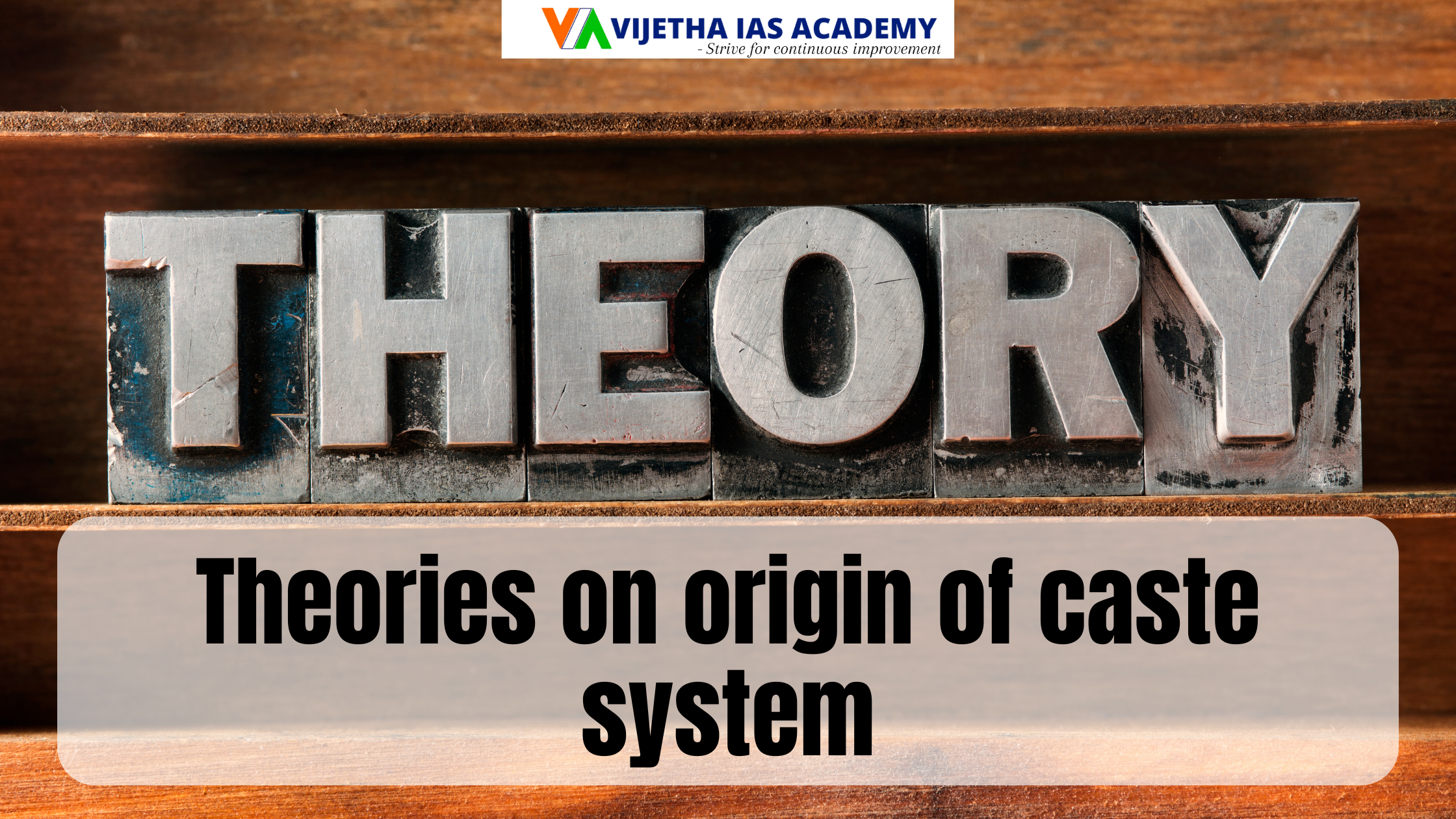
Discuss the theories on origin of caste system and its criticism in India. Differentiate between caste, class and race. (15 Marks) Anthropology Optional Paper CSE 2024
Discuss the theories on origin of caste system and its criticism in India. Differentiate between caste, class and race.
(15 Marks) Anthropology Optional Paper CSE 2024
Introduction
The caste system in India is one of the most deeply ingrained social structures, traditionally organizing society into hierarchical groups based on occupation, birth, and social status. The origins of the caste system have been debated by scholars, and several theories have been proposed to explain its evolution. Alongside caste, social structures like class and race also contribute to stratification, though they differ in form and function. Understanding these distinctions is crucial for comprehending the broader dimensions of social inequality.
Main Body
Theories on the Origin of the Caste System:
Racial Theory:
Proposed by British scholars during the colonial era, this theory suggests that the Aryan invasion of the Indian subcontinent led to the creation of the caste system. The theory posits that the Aryans established themselves as a superior race, placing the indigenous Dravidians in lower strata of society.
Criticism: This theory has been criticized for its Eurocentric biases and racial undertones. Modern genetics has challenged the simplistic racial division between Aryans and Dravidians, pointing to a more complex population history of India.
Occupational Theory:
This theory argues that the caste system originated as a division of labor based on occupations. Different groups specialized in different tasks such as priests (Brahmins), warriors (Kshatriyas), traders (Vaishyas), and laborers (Shudras). Over time, these roles became hereditary, solidifying into the rigid caste hierarchy.
Criticism: Critics argue that while occupational divisions existed, the theory doesn’t fully explain the social rigidity and endogamy characteristic of the caste system. Additionally, it overlooks the religious and ritual aspects that reinforce caste distinctions.
Religious Theory:
The Varna system as described in ancient Hindu texts is often cited as the religious foundation of the caste system. It divides society into four varnas (Brahmin, Kshatriya, Vaishya, and Shudra), based on duties and qualities, and assigns specific roles to each.
Criticism: This theory fails to account for the rigidity and social inequalities of the actual caste system. The varna system is often seen as more flexible than the caste system, which developed later with more rigid social boundaries and hierarchical practices.
Evolutionary and Functionalist Theory:
Some sociologists argue that the caste system evolved as a social structure to maintain order and stability in a complex agrarian society. The system functioned as a social control mechanism, ensuring that each group contributed to the economic and social functioning of the society.
Criticism: While it explains the stability of the system, it is criticized for justifying caste-based inequalities and not addressing the exploitative nature of the caste hierarchy.
Criticism of the Caste System:
The caste system has been widely criticized for promoting social inequality, discrimination, and exclusion. It has perpetuated untouchability, denied basic human rights to lower castes, and restricted upward social mobility.
Reformers like Dr. B.R. Ambedkar have strongly opposed the caste system, advocating for equality and abolition of caste-based discrimination. Modern legal frameworks, including the Constitution of India, prohibit caste-based discrimination, though it persists in various forms in contemporary India.
Difference between Caste, Class, and Race:
Caste:
Basis: Hereditary social group based on birth, occupation, and rituals.
Structure: Rigid hierarchy with little social mobility. Caste is determined by birth and individuals remain in the same caste throughout life.
Example: The caste system in India, where individuals are born into a specific caste like Brahmin, Kshatriya, or Dalit.
Class:
Basis: Economic standing and control over resources, wealth, and power.
Structure: More fluid than caste, allowing for social mobility through education, occupation, or wealth accumulation. Class is determined by economic factors, not birth.
Example: The distinction between upper, middle, and lower classes based on income and wealth distribution.
Race:
Basis: Physical characteristics like skin color, facial features, and genetic ancestry.
Structure: While race is socially constructed, it often forms a basis for systemic discrimination. Like caste, race is often hereditary, but its social significance varies across societies.
Example: Racial divisions in societies like the U.S., where race influences social status and access to resources.
Conclusion
The caste system has complex origins, influenced by racial, occupational, and religious factors. It has been a key mechanism of social stratification in India but has also drawn criticism for perpetuating inequality and exclusion. When compared to class and race, caste is unique for its rigid, birth-based hierarchy. However, like class and race, it functions as a marker of social identity and inequality. Understanding these distinctions helps in addressing the multifaceted nature of social stratification and advancing social justice.
Anthropology Test Series Programme (Online + Offline))
We provide Anthropology Daily Answer Writing a range of programs designed to cater to various stages of UPSC preparation. Whether you're just starting out, have attempted the Mains before, or are getting ready for Mains 2024, we have the right option for you. Allow us to assist you in choosing the course that best fits your needs.
|
Level of Preparation |
Test Series Program |
Test Series Content |
Test Schedule |
|
Self-study of Anthropology Optional |
Anthropology 100 Days Personal Mentorship Program |
Daily answer writing, 34 sectional tests, 6 comprehensive tests, and complementary Mains Special 12 tests (between prelims and mains) |
|
|
Revise whole syllabus through Daily Answer Writing Practice and Tests |
Anthropology DAW Mentorship Program |
Daily Answer Writing Practice and 8 sectional and 4 Full Length tests |
|
|
Revise whole syllabus through Sectional and Full Length Tests |
Anthropology Tier- I T-40 Test Series |
34 Sectionals and 6 Full Length Tests |
|
|
Written Mains earlier and need more practice |
16-Anthropology Tier II Test Series |
10 sectional and 6 Full-Length Tests. |
|
|
Cleared Prelims 2023 and are preparing for Mains 2023 |
Mains Special 12 Tests program |
8 Sectional and 4 Full-Length Tests |
ANTHROPOLOGY MAINS SPECIAL COURSES
Enroll in our Anthropology Mentorship Program today and take the first step towards achieving your UPSC goals!
1) If you are going for Self study of Anthropology Optional and looking for a Comprehensive Program that includes Daily Answer Writing, 34 Sectional tests, 6 Comprehensive tests, and Complementary mains special 12 tests (between prelims and mains), our Anthropology 100 Days Personal Mentorship Program is the perfect choice.
2) If you want to revise Whole Syllabus through Daily Answer Writing Practice and 8 sectional and 4 full length tests, then our Anthropology DAW Mentorship Program is the best fit for you.
3) If you want to revise Whole Syllabus through 34 Sectionals and 6 Full Length Tests then Anthropology Tier- I T-40 Test Series is for you.
4) If you have written Mains earlier and need more practice, then our 16-Anthropology Tier II Test Series is a great option. This test series includes 10 sectional and 6 full-length tests.
5) if you have cleared Prelims 2023 and are preparing for Mains 2023,our Mains Special 12 Tests program is a must-have. This program includes 8 sectional and 4 full-length tests to help you prepare for the big day.
For more information on Vijetha IAS Academy’s Anthropology mentorship programs Deatils : https://vijethaiasacademy.com/anthropology-test-series
Anthropology 100 Days Personal Mentorship Program ( 7 + 3 Times Revision )

Anthropology 60 Days Personal Mentorship Program ( 4 + 3 Times Revision )

For more information: https://vijethaiasacademy.com/anthropology-test-series
Details Of Anthropology Classes Program
Top Anthropology Optional IAS Coaching Center in Delhi Vijetha IAS Academy | Best Anthropology Optional IAS Coaching in Delhi
Fee Structure:
- Tier 1: Rs. 55,150/- (3 Years Validity of Offline/Live Batch)
- Tier 2: Rs. 42,000/-
- Tier 3: Rs. 36,000/-
Batch Size: 50 – 60 Students
UPSC Notes
Anthropology Optional IAS Coaching Notes, IAS Exam Preparation Booklets, IAS optional coaching Notes, UPSC Coaching Notes, Video Lectures, Live Classes with faculty, Chat Facility Available
Teachers Name: N P Kishore Sir
Past Result
- Last Years Result 2023
- 35 Total Selections in CSE 2023
Google Reviews: 4.9 out of 5 stars
Website: Vijetha Anthropology Optional IAS Coaching in Delhi (https://vijethaiasacademy.com)
Faculties of Vijetha IAS Academy
- N P Kishore Sir
Features
- Vijetha IAS Academy offers Online and offline Courses for better preparation of Anthropology Optional Strategy for UPSC in Delhi.
- For better Anthropology optional Exam Preparation, Vijetha IAS Academy Delhi Conducts the Motivational IAS Session.
- Vijetha IAS Academy provides you with the CASE STUDIES on the pattern of the real-time IAS Exam which is helpful for better preparation of the Best Coaching for UPSC Anthropology Optional Optional IAS Examination.
- DAW & WAW – Revision Through Daily & Weekly Answer Writing Practice is offered by Vijetha IAS Academy for better result of the Anthropology Optional IAS examination.
Advantages of joining Vijetha IAS Academy
- Best Faculties for Anthropology Optional IAS Coaching in Delhi
- Best facilities, infrastructure and updated Case Studies Booklets and Notes for better preparation of the Anthropology Optional IAS Examination in Delhi.
- Best result in Past years for Anthropology Optional Strategy for UPSC Examination in Delhi
- Best Rated coaching institute for Anthropology Optional IAS Examination in Delhi.
- Vijetha IAS Academy also provides recorded lectures videos, notes which is very helpful for better preparation of Anthropology Optional IAS Coaching in Delhi
Fees Structure of Vijetha IAS Academy
|
Tier 2 |
Tier 1 |
Tier 3 |
BATCH STARTS FROM |
|
42,000/- |
55,150/- (3 Years Validity Offline/Live Batch) |
36,000/- |
REGISTRATION – START |
Fees Structure of Vijetha IAS Academy
|
Course Name |
Fees Amount |
Course Duration |
|
GS Offline (Pre + Mains+ CSAT) with Essay+Answer Writing |
Rs.99,000 (Including GST) |
400+ Days |
|
GS Online |
Rs.18,999 (Including GST) |
400+ Days |
|
GS Mentorship Programme |
Rs.29,999 (Including GST) |
1 Year |
For more information on our courses, visit our Anthropology Courses page. Explore our Test Series and Online Courses for flexible learning options.
Vijetha IAS Academy
Add. 2nd Floor, 50, Shankar Road, Block 7, Old Rajinder Nagar, Rajinder Nagar, New Delhi, Delhi 110060
MOB. 096508 52636
Open 7 Am : Closes 9 PM
Keywords: origin of caste system, caste system theories, caste vs class vs race, anthropology 2024 question paper, Anthropology optional subject question paper 2024, Anthropology optional 2024 question paper, Anthropology Optional Coaching UPSC, Vijetha IAS Academy Anthropology, Anthropology crash course UPSC, Anthropology daily answer writing UPSC, Kishore sir Anthropology

Elucidate the resurgence of ethno-nationalism from an anthropological lens. (15 Marks) Anthropology Optional Paper CSE 2024
Elucidate the resurgence of ethno-nationalism from an anthropological lens.
(15 Marks) Anthropology Optional Paper CSE 2024
Introduction
Ethno-nationalism refers to a form of nationalism where the ethnic identity of a group becomes the basis for political mobilization, often emphasizing the distinctiveness and rights of the ethnic group within a state or region. In recent decades, there has been a resurgence of ethno-nationalism across the globe, driven by factors such as globalization, migration, and perceived threats to cultural identity. From an anthropological perspective, ethno-nationalism can be understood as a reaction to social, political, and economic changes, and a way for communities to assert their cultural sovereignty.
Main Body
Anthropological Understanding of Ethno-nationalism:
Ethnicity as a Social Construct: Anthropologists view ethnicity as a socially constructed identity, formed through shared language, culture, religion, or history. Ethno-nationalism emerges when ethnic groups mobilize these cultural markers to assert political rights or seek greater autonomy within or outside the framework of a nation-state.
Primordial vs. Instrumentalist Approaches: Anthropologists often debate between primordialism, which sees ethnic identity as deeply rooted and timeless, and instrumentalism, which argues that ethnic identities are politically constructed to achieve specific goals, such as statehood or access to resources.
Factors Driving the Resurgence of Ethno-nationalism:
Globalization and Cultural Insecurity:
The forces of globalization—economic integration, migration, and the spread of global culture—have triggered fears of cultural erosion. Communities turn to ethno-nationalism as a response to safeguard their traditions, languages, and cultural practices from homogenization.
Political Marginalization: Many ethnic groups feel politically marginalized in multi-ethnic states, where they are denied representation or control over resources. In such cases, ethno-nationalism serves as a political movement aimed at rectifying these grievances, as seen in movements like the Kurds in the
Middle East or Catalonia in Spain.
Historical Memory and Identity:
Anthropologists emphasize the role of collective memory in ethno-nationalism. Historical events, such as colonization, wars, or forced migrations, often become central narratives in the resurgence of ethno-nationalist movements, as these communities seek reparation or recognition of past injustices.
Case Studies in Ethno-nationalism:
Scotland and Catalonia: Both regions have experienced a resurgence of ethno-nationalism driven by historical identity and the desire for greater autonomy or independence. In Catalonia, cultural and linguistic differences have fueled demands for independence from Spain, while Scotland’s movement is tied to the preservation of its distinct legal and cultural traditions.
Indigenous Movements:
In countries like Canada and Australia, indigenous groups have adopted ethno-nationalism to fight for land rights and cultural preservation. Their movements focus on achieving self-determination and regaining control over ancestral territories.
South Asia: In India, ethno-nationalism has manifested in movements such as the Naga struggle for independence and the Gorkhaland movement. These groups seek autonomy based on ethnic distinctiveness and cultural identity, often citing historical marginalization by the central government.
Impact of Ethno-nationalism:
Political Fragmentation: The resurgence of ethno-nationalism can lead to political fragmentation within states, as ethnic groups push for regional autonomy, federalism, or even secession. This can challenge the stability of multi-ethnic nations, as seen in the disintegration of Yugoslavia.
Cultural Revitalization: On the positive side, ethno-nationalism often leads to the revitalization of cultural practices, languages, and traditions. Communities invest in preserving and promoting their cultural heritage, which strengthens group solidarity.
Conflict and Violence: In some cases, ethno-nationalism can fuel ethnic conflict or violence, particularly when groups compete over resources or political power. The Rwandan Genocide and the ongoing conflict in Myanmar with the Rohingya are tragic examples of how ethno-nationalism can exacerbate divisions and lead to violence.
Anthropological Critique:
Anthropologists critique ethno-nationalism for sometimes promoting exclusionary politics, where the focus on ethnic identity may marginalize minorities within the group or reinforce ethnic hierarchies. Additionally, ethno-nationalist movements can be manipulated by political elites for personal or group gain, detracting from the broader goals of social justice or inclusion.
Global vs. Local Dynamics: While ethno-nationalism is a local phenomenon rooted in specific historical and cultural contexts, it is increasingly influenced by global political trends. Anthropologists stress the need to examine how international politics, diaspora networks, and transnational identities contribute to the shaping of ethno-nationalist movements.
Conclusion
The resurgence of ethno-nationalism reflects deeper concerns about identity, cultural survival, and political autonomy in the face of global changes. From an anthropological perspective, it can be viewed as both a reaction to external pressures and a means of reclaiming sovereignty and cultural rights. However, while ethno-nationalism can promote cultural preservation and political empowerment, it also raises concerns about exclusion, conflict, and social fragmentation. A balanced understanding of its causes and consequences is essential for addressing the complex dynamics of ethno-nationalism in a globalized world.
Anthropology Test Series Programme (Online + Offline))
We provide Anthropology Daily Answer Writing a range of programs designed to cater to various stages of UPSC preparation. Whether you're just starting out, have attempted the Mains before, or are getting ready for Mains 2024, we have the right option for you. Allow us to assist you in choosing the course that best fits your needs.
|
Level of Preparation |
Test Series Program |
Test Series Content |
Test Schedule |
|
Self-study of Anthropology Optional |
Anthropology 100 Days Personal Mentorship Program |
Daily answer writing, 34 sectional tests, 6 comprehensive tests, and complementary Mains Special 12 tests (between prelims and mains) |
|
|
Revise whole syllabus through Daily Answer Writing Practice and Tests |
Anthropology DAW Mentorship Program |
Daily Answer Writing Practice and 8 sectional and 4 Full Length tests |
|
|
Revise whole syllabus through Sectional and Full Length Tests |
Anthropology Tier- I T-40 Test Series |
34 Sectionals and 6 Full Length Tests |
|
|
Written Mains earlier and need more practice |
16-Anthropology Tier II Test Series |
10 sectional and 6 Full-Length Tests. |
|
|
Cleared Prelims 2023 and are preparing for Mains 2023 |
Mains Special 12 Tests program |
8 Sectional and 4 Full-Length Tests |
ANTHROPOLOGY MAINS SPECIAL COURSES
Enroll in our Anthropology Mentorship Program today and take the first step towards achieving your UPSC goals!
1) If you are going for Self study of Anthropology Optional and looking for a Comprehensive Program that includes Daily Answer Writing, 34 Sectional tests, 6 Comprehensive tests, and Complementary mains special 12 tests (between prelims and mains), our Anthropology 100 Days Personal Mentorship Program is the perfect choice.
2) If you want to revise Whole Syllabus through Daily Answer Writing Practice and 8 sectional and 4 full length tests, then our Anthropology DAW Mentorship Program is the best fit for you.
3) If you want to revise Whole Syllabus through 34 Sectionals and 6 Full Length Tests then Anthropology Tier- I T-40 Test Series is for you.
4) If you have written Mains earlier and need more practice, then our 16-Anthropology Tier II Test Series is a great option. This test series includes 10 sectional and 6 full-length tests.
5) if you have cleared Prelims 2023 and are preparing for Mains 2023,our Mains Special 12 Tests program is a must-have. This program includes 8 sectional and 4 full-length tests to help you prepare for the big day.
For more information on Vijetha IAS Academy’s Anthropology mentorship programs Deatils : https://vijethaiasacademy.com/anthropology-test-series
Anthropology 100 Days Personal Mentorship Program ( 7 + 3 Times Revision )

Anthropology 60 Days Personal Mentorship Program ( 4 + 3 Times Revision )

For more information: https://vijethaiasacademy.com/anthropology-test-series
Details Of Anthropology Classes Program
Top Anthropology Optional IAS Coaching Center in Delhi Vijetha IAS Academy | Best Anthropology Optional IAS Coaching in Delhi
Fee Structure:
- Tier 1: Rs. 55,150/- (3 Years Validity of Offline/Live Batch)
- Tier 2: Rs. 42,000/-
- Tier 3: Rs. 36,000/-
Batch Size: 50 – 60 Students
UPSC Notes
Anthropology Optional IAS Coaching Notes, IAS Exam Preparation Booklets, IAS optional coaching Notes, UPSC Coaching Notes, Video Lectures, Live Classes with faculty, Chat Facility Available
Teachers Name: N P Kishore Sir
Past Result
- Last Years Result 2023
- 35 Total Selections in CSE 2023
Google Reviews: 4.9 out of 5 stars
Website: Vijetha Anthropology Optional IAS Coaching in Delhi (https://vijethaiasacademy.com)
Faculties of Vijetha IAS Academy
- N P Kishore Sir
Features
- Vijetha IAS Academy offers Online and offline Courses for better preparation of Anthropology Optional Strategy for UPSC in Delhi.
- For better Anthropology optional Exam Preparation, Vijetha IAS Academy Delhi Conducts the Motivational IAS Session.
- Vijetha IAS Academy provides you with the CASE STUDIES on the pattern of the real-time IAS Exam which is helpful for better preparation of the Best Coaching for UPSC Anthropology Optional Optional IAS Examination.
- DAW & WAW – Revision Through Daily & Weekly Answer Writing Practice is offered by Vijetha IAS Academy for better result of the Anthropology Optional IAS examination.
Advantages of joining Vijetha IAS Academy
- Best Faculties for Anthropology Optional IAS Coaching in Delhi
- Best facilities, infrastructure and updated Case Studies Booklets and Notes for better preparation of the Anthropology Optional IAS Examination in Delhi.
- Best result in Past years for Anthropology Optional Strategy for UPSC Examination in Delhi
- Best Rated coaching institute for Anthropology Optional IAS Examination in Delhi.
- Vijetha IAS Academy also provides recorded lectures videos, notes which is very helpful for better preparation of Anthropology Optional IAS Coaching in Delhi
Fees Structure of Vijetha IAS Academy
|
Tier 2 |
Tier 1 |
Tier 3 |
BATCH STARTS FROM |
|
42,000/- |
55,150/- (3 Years Validity Offline/Live Batch) |
36,000/- |
REGISTRATION – START |
Fees Structure of Vijetha IAS Academy
|
Course Name |
Fees Amount |
Course Duration |
|
GS Offline (Pre + Mains+ CSAT) with Essay+Answer Writing |
Rs.99,000 (Including GST) |
400+ Days |
|
GS Online |
Rs.18,999 (Including GST) |
400+ Days |
|
GS Mentorship Programme |
Rs.29,999 (Including GST) |
1 Year |
For more information on our courses, visit our Anthropology Courses page. Explore our Test Series and Online Courses for flexible learning options.
Vijetha IAS Academy
Add. 2nd Floor, 50, Shankar Road, Block 7, Old Rajinder Nagar, Rajinder Nagar, New Delhi, Delhi 110060
MOB. 096508 52636
Open 7 Am : Closes 9 PM
Keywords:
anthropology 2024 question paper, Anthropology optional subject question paper 2024, Anthropology optional 2024 question paper, Anthropology Optional Coaching UPSC, Vijetha IAS Academy Anthropology, Anthropology crash course UPSC, Anthropology daily answer writing UPSC, Kishore sir Anthropology, ethnonationalism, anthropological analysis, cultural identity.

Anthropology Daily Answer Writing | Test Series For Upsc
Anthropology Daily Answer Writing | Test Series for UPSC
Strategic planning and committed preparation Anthropology Daily Answer Writing are essential for the demanding UPSC Civil Services Examination. To perform highly on the Mains exam in particular, one must have a thorough comprehension of the material and exceptional writing abilities. Selecting the appropriate optional subject can significantly impact candidates seeking to achieve success in the Mains. For many UPSC candidates, Anthropology Daily Answer Writing is the greatest and easiest optional because of its short curriculum, score potential, and overlap with general studies.
The Importance of Anthropology Daily Answer Writing
1. Refines Answer Writing Skills
Anthropology Daily Answer Writing mpactful answers. It enables aspirants to organize their thoughts, present arguments logically, and substantiate them with relevant facts and examples. A consistent test series helps students improve their writing style, making it more examiner-friendly.
2. Enhances Speed and Accuracy
In the UPSC Mains exam, time management is essential. Aspirants need to answer questions accurately and within the allotted time. Regular practice through a test series helps in building speed and accuracy, enabling candidates to cover all the Anthropology Daily Answer Writing questions within the time frame without compromising the quality of their answers.
3. Boosts Confidence and Reduces Exam Anxiety
Regularly participating in a daily answer writing test series builds confidence. It familiarizes aspirants with the type of questions asked in the Mains and the expected answer formats. This reduces exam anxiety, as candidates know what to expect and how to approach each question effectively.
4. Provides Regular Feedback
One of the significant advantages of a structured test series is the feedback provided. Detailed feedback helps aspirants understand their strengths and identify areas that need improvement. It allows them to refine their strategies and focus on enhancing their weaker areas, leading to a more comprehensive preparation.
Why Anthropology is the Best and Easiest Optional for UPSC
Selecting the right optional subject is crucial in the Mains examination, as it can significantly influence an aspirant’s overall score. Here’s why Anthropology is considered the best and easiest optional for UPSC:
1. Concise and Manageable Syllabus
One of the main reasons for the popularity of Anthropology among UPSC aspirants is its well-defined and concise syllabus. Unlike other optional subjects, Anthropology has a manageable syllabus that allows students to cover the entire content effectively within a limited time frame. This enables aspirants to focus on mastering the subject rather than being overwhelmed by the volume of material.
2. High Scoring Potential
Anthropology is known for its scoring potential. The subject’s questions are usually direct and require factual, well-structured answers. Using diagrams, flowcharts, and case studies in answers can significantly enhance their quality, making them more appealing to examiners. This direct approach makes it easier for students to score well in this subject.
3. Overlap with General Studies
Another advantage of choosing Anthropology as an optional is its overlap with the General Studies papers. Topics like society, culture, human evolution, and social institutions are relevant to both Anthropology and General Studies. This overlap allows aspirants to prepare for both sections simultaneously, making their preparation more efficient and time-effective.
4. Interesting and Engaging Content
Anthropology covers fascinating topics such as human evolution, cultural diversity, and social institutions, making the subject interesting and engaging. This makes studying Anthropology enjoyable, which is crucial for maintaining consistency and motivation during the preparation phase.
Vijetha IAS Academy: Leading the Way in Anthropology Daily Answer Writing
For over a decade, Vijetha IAS Academy has been a pioneer in providing the best Anthropology Optional Coaching in India. Our student-centric approach and commitment to excellence have made us the preferred choice for UPSC Anthropology aspirants across the country.
1. Student-Centric Approach
At Vijetha IAS Academy, our focus is on the success of our students. We have designed our programs to cater to the unique needs of each aspirant, providing personalized guidance and support. We emphasize building a strong foundation and developing the skills necessary to excel in the UPSC exam.
2. Experienced Faculty
Our team, led by Kishore Sir, consists of experienced educators who bring a wealth of knowledge and expertise to the table. Kishore Sir's background in Anthropology, combined with his experience teaching Environment, General Science, and Science & Technology, provides a holistic approach to UPSC preparation. His mentorship has guided numerous students toward success.
3. Proven Success Record
Vijetha IAS Academy has mentored over 100,000 students, helping them achieve their UPSC aspirations. Our proven success record is a testament to the quality of education and mentorship we provide. Our Anthropology Daily Answer Writing test series, in particular, has played a crucial role in helping students enhance their answer-writing skills and excel in the Mains exam.
4. Comprehensive Test Series
We offer a comprehensive test series for Prelims, Mains, and daily answer writing sessions. Our test series provides valuable feedback, helping students identify their strengths and areas for improvement. This continuous feedback loop ensures that students are well-prepared for every stage of the exam, building their readiness and confidence.
Conclusion
Anthropology Daily Answer Writing practice is indispensable for success in the UPSC Mains exam. Selecting the right optional subject, such as Anthropology, can significantly impact an aspirant's performance. With its concise syllabus, scoring potential, and overlap with General Studies, Anthropology is the best and easiest optional for UPSC. At Vijetha IAS Academy, our Anthropology Daily Answer Writing Test Series, guided by Kishore Sir, offers the best preparation experience for aspirants aiming to succeed in UPSC. Join us and take the first step towards realizing your dream of becoming a civil servant. To learn more about our programs, visit Vijetha IAS Academy's Anthropology Courses.
Fee Details Anthropology Daily Answer Writing Program 2025
Anthropology Daily Answer Writing at Vijetha IAS Academy
At Vijetha IAS Academy, we offer a specialized Anthropology 30 Days Daily Answer Writing + 12 Mains Tests program, designed to help UPSC aspirants refine their answer-writing skills within a short but intensive time frame. This program is crafted to meet the needs of students preparing for the Anthropology Optional in UPSC, providing both daily practice and comprehensive evaluation.
The 30 Days Daily Answer Writing segment allows students to write answers to carefully selected questions every day, helping them improve their speed, accuracy, and content organization. In addition, the 12 Mains Tests included in the program simulate the actual exam conditions, ensuring that candidates are not only writing consistently but also testing their knowledge under real-time pressure.
FAQs Anthropology Daily Answer Writing
1. What is Daily Answer Writing, and why is it important for UPSC preparation?
Daily Answer Writing involves practicing writing structured answers to UPSC-type questions every day. This helps candidates develop clarity, speed, and precision in their responses. At Vijetha IAS Academy, students are encouraged to write daily to enhance their answer-writing skills, receive detailed feedback, and ensure they are ready for the mains exam.
2. How does Vijetha IAS Academy support Daily Answer Writing practice?
Vijetha IAS Academy offers a dedicated Anthropology Daily Answer Writing Program that provides students with curated questions, regular writing practice, and expert feedback from Kishore Sir and his team. This structured practice is key to improving both content quality and answer presentation.
3. Can I join Daily Answer Writing sessions without attending regular classes at Vijetha IAS Academy?
Yes, Vijetha IAS Academy offers standalone Daily Answer Writing programs, especially for Anthropology Optional. Even if you are not enrolled in regular classes, you can join the writing practice sessions and benefit from personalized feedback.
4. How is feedback provided during Daily Answer Writing practice at Vijetha IAS Academy?
Feedback at Vijetha IAS Academy is detailed and personalized. Experts like Kishore Sir evaluate each answer, highlighting strengths and areas of improvement, such as content enrichment, structure, and time management, to help students refine their writing style.
5. How many answers should I write daily to improve my performance in UPSC Mains?
Writing at least 1-2 answers daily is recommended. At Vijetha IAS Academy, students are given daily writing tasks to ensure consistent practice, covering important topics and previous years’ questions in Anthropology Optional.
6. Does Vijetha IAS Academy provide previous year UPSC questions for practice in Daily Answer Writing?
Yes, Vijetha IAS Academy integrates previous year UPSC questions into its Daily Answer Writing program, especially for Anthropology. This ensures students are familiar with the types of questions and the format expected by the UPSC examiners.
7. How long should I spend on Daily Answer Writing every day?
On average, students should spend 1-2 hours daily on answer writing. Vijetha IAS Academy suggests a focused and timed approach, where students practice under exam-like conditions to improve speed and precision in their responses.
8. Will Daily Answer Writing help me with other parts of the UPSC Mains exam?
Absolutely. While Daily Answer Writing at Vijetha IAS Academy focuses on Anthropology Optional, the skills you develop—such as structuring answers, time management, and articulating concepts clearly—are transferable to other papers in the UPSC Mains.
9. Can I access Daily Answer Writing materials online from Vijetha IAS Academy?
Yes, Vijetha IAS Academy offers online platforms where students can access daily writing tasks, submit answers, and receive feedback remotely. This is ideal for candidates preparing from different parts of India or who prefer online learning.
10. How can I join the Daily Answer Writing program at Vijetha IAS Academy?
You can join Vijetha IAS Academy’s Daily Answer Writing program by visiting their official website or contacting their team. This program is specifically tailored for Anthropology Optional, providing curated questions and expert guidance to ensure students are well-prepared for UPSC Mains.
For more information on our courses, visit our Anthropology Courses page. Explore our Test Series and Online Courses and Daily Answer Writing for flexible learning options.
Vijetha IAS Academy
Add. 2nd Floor, 50, Shankar Road, Block 7, Old Rajinder Nagar, Rajinder Nagar, New Delhi, Delhi 110060
MOB. 096508 52636
Open 7 Am : Closes 9 PM
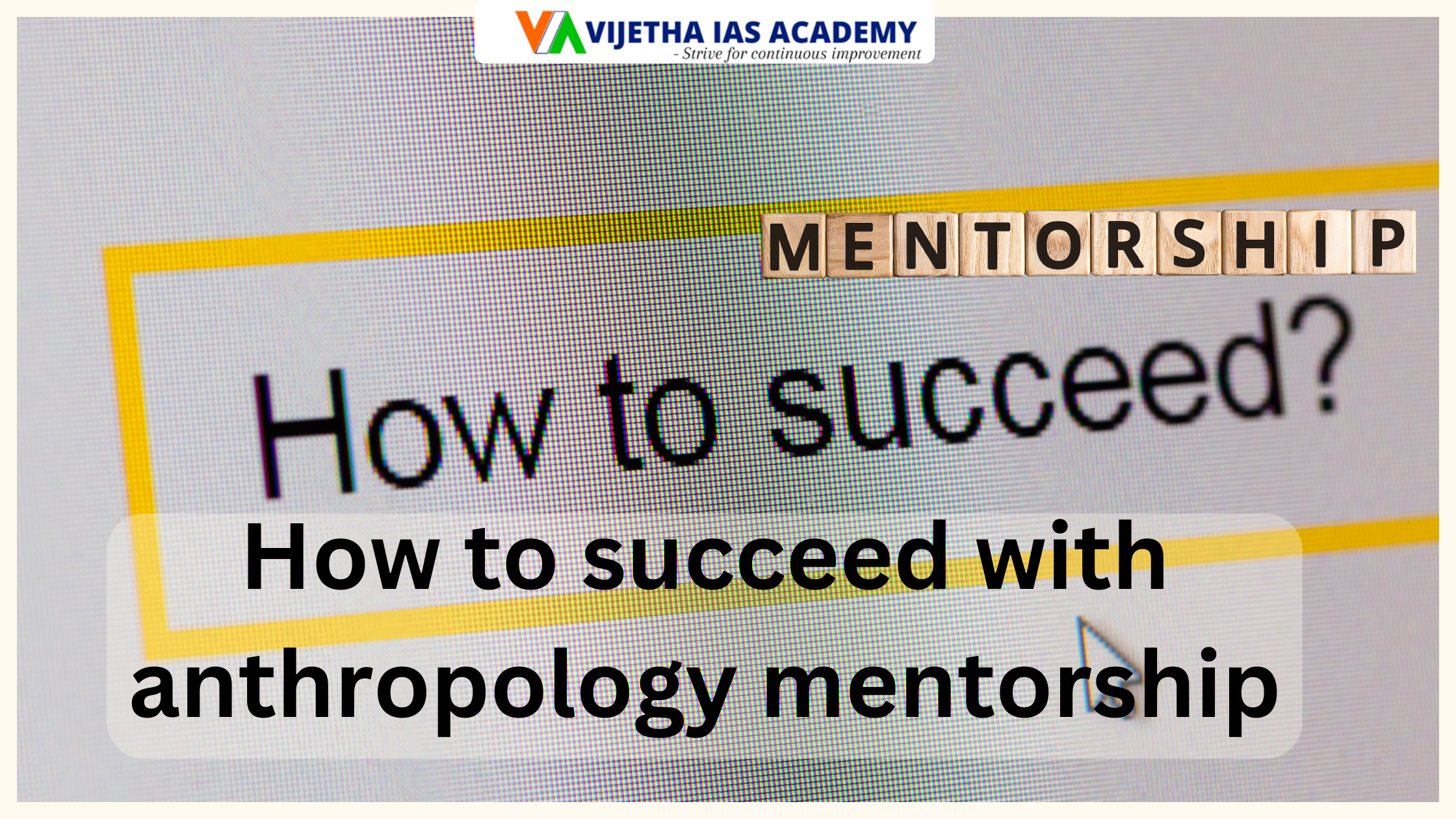
How to succeed with anthropology mentorship
How to Succeed with Anthropology Mentorship
Preparing for the UPSC Civil Services Examination can be a daunting journey, but choosing the right optional subject and mentorship can significantly ease the path to success. Anthropology is recognized as one of the best and easiest optional subjects for UPSC due to its focused syllabus and high scoring potential. This blog post explores how to succeed with Anthropology mentorship, emphasizing the benefits of long-term guidance, and highlighting the role of Vijetha IAS Academy and N P Kishore in your preparation.
How to Succeed with Anthropology Mentorship
1. Choose the Right Mentorship Program
Selecting a high-quality mentorship program is crucial for success in Anthropology. A well-structured program offers personalized guidance, tailored study plans, and expert insights into the subject.
Vijetha IAS Academy stands out as a premier choice for Anthropology mentorship. For over ten years, Vijetha IAS has maintained a student-centric approach, becoming the top choice for UPSC Anthropology students across India. They offer a range of services, including Anthropology Optional Coaching, Test Series, Mentorship Programmes, and Crash Courses.
Explore Vijetha IAS Academy’s Anthropology courses
Key Features of Vijetha IAS Academy’s Mentorship:
- Expert faculty, including N P Kishore, who has a rich background in Anthropology and UPSC preparation.
- Comprehensive study materials and case studies.
- Personalized guidance and support throughout your preparation journey.
2. Build a Strong Foundation
A successful mentorship experience begins with building a strong foundation in Anthropology. This involves thoroughly understanding core concepts and topics covered in both Paper I (Physical Anthropology) and Paper II (Cultural Anthropology).
Core Areas to Focus On:
- Paper I: Evolutionary theory, human genetics, primatology, and adaptation.
- Paper II: Indian society, kinship systems, marriage, religion, and economic systems.
Long-Term Benefits:
- A solid grasp of foundational topics allows for more efficient learning of advanced concepts.
- It helps in effectively answering questions in both Prelims and Mains.
3. Develop a Structured Study Plan
A well-organized study plan is essential for systematic preparation. A long-term mentorship program helps in creating a structured timetable that ensures comprehensive coverage of the syllabus.
Components of an Effective Study Plan:
- Daily Study Schedule: Allocate specific time slots for different topics and revision.
- Regular Assessments: Take periodic tests and quizzes to evaluate your progress.
- Revision Sessions: Schedule regular revision to reinforce your learning and retention.
Long-Term Benefits:
- A structured approach helps in managing time effectively and avoiding last-minute stress.
- It ensures that all topics are covered thoroughly and in a systematic manner.
4. Utilize Expert Guidance
Leverage the expertise of your mentors to clarify doubts, gain deeper insights, and receive feedback on your performance. N P Kishore, with his extensive experience and academic qualifications, provides valuable guidance in Anthropology.
Benefits of Expert Guidance:
- Clarification of complex concepts and theories.
- Personalized feedback on answer writing and case studies.
- Insights into effective study strategies and exam techniques.
Vijetha IAS Academy’s Expertise:
- N P Kishore’s extensive background in Anthropology and his experience as a scientist and mentor contribute to high-quality instruction.
- Access to specialized resources and case studies enhances your preparation.
5. Practice Answer Writing and Case Studies
Effective answer writing and case studies are critical components of UPSC preparation. Long-term mentorship programs typically include practice sessions and feedback on answer writing.
Key Areas to Focus On:
- Answer Writing: Practice writing concise, well-structured answers that address the question directly.
- Case Studies: Analyze and solve case studies related to Anthropology topics to develop a practical understanding.
Long-Term Benefits:
- Improved writing skills and ability to articulate complex concepts clearly.
- Enhanced problem-solving skills and application of theoretical knowledge to practical scenarios.
6. Prepare for the Interview Stage
The final stage of the UPSC examination is the interview, where you need to demonstrate your knowledge, personality, and suitability for the civil services. Long-term mentorship programs often include mock interviews and personality development sessions.
Interview Preparation Components:
- Mock Interviews: Simulate real interview scenarios to practice responses and improve your presentation skills.
- Personality Development: Work on communication skills, confidence, and overall demeanor.
Long-Term Benefits:
- Increased confidence and preparedness for the actual interview.
- Improved ability to handle questions and present yourself effectively.
Anthropology Test Series Programme (Online + Offline))
We provide Anthropology Daily Answer Writing a range of programs designed to cater to various stages of UPSC preparation. Whether you're just starting out, have attempted the Mains before, or are getting ready for Mains 2024, we have the right option for you. Allow us to assist you in choosing the course that best fits your needs.
|
Level of Preparation |
Test Series Program |
Test Series Content |
Test Schedule |
|
Self-study of Anthropology Optional |
Anthropology 100 Days Personal Mentorship Program |
Daily answer writing, 34 sectional tests, 6 comprehensive tests, and complementary Mains Special 12 tests (between prelims and mains) |
|
|
Revise whole syllabus through Daily Answer Writing Practice and Tests |
Anthropology DAW Mentorship Program |
Daily Answer Writing Practice and 8 sectional and 4 Full Length tests |
|
|
Revise whole syllabus through Sectional and Full Length Tests |
Anthropology Tier- I T-40 Test Series |
34 Sectionals and 6 Full Length Tests |
|
|
Written Mains earlier and need more practice |
16-Anthropology Tier II Test Series |
10 sectional and 6 Full-Length Tests. |
|
|
Cleared Prelims 2023 and are preparing for Mains 2023 |
Mains Special 12 Tests program |
8 Sectional and 4 Full-Length Tests |
ANTHROPOLOGY MAINS SPECIAL COURSES
Enroll in our Anthropology Mentorship Program today and take the first step towards achieving your UPSC goals!
1) If you are going for Self study of Anthropology Optional and looking for a Comprehensive Program that includes Daily Answer Writing, 34 Sectional tests, 6 Comprehensive tests, and Complementary mains special 12 tests (between prelims and mains), our Anthropology 100 Days Personal Mentorship Program is the perfect choice.
2) If you want to revise Whole Syllabus through Daily Answer Writing Practice and 8 sectional and 4 full length tests, then our Anthropology DAW Mentorship Program is the best fit for you.
3) If you want to revise Whole Syllabus through 34 Sectionals and 6 Full Length Tests then Anthropology Tier- I T-40 Test Series is for you.
4) If you have written Mains earlier and need more practice, then our 16-Anthropology Tier II Test Series is a great option. This test series includes 10 sectional and 6 full-length tests.
5) if you have cleared Prelims 2023 and are preparing for Mains 2023,our Mains Special 12 Tests program is a must-have. This program includes 8 sectional and 4 full-length tests to help you prepare for the big day.
For more information on Vijetha IAS Academy’s Anthropology mentorship programs Deatils : https://vijethaiasacademy.com/anthropology-test-series
Anthropology 100 Days Personal Mentorship Program ( 7 + 3 Times Revision )

Anthropology 60 Days Personal Mentorship Program ( 4 + 3 Times Revision )

Conclusion
Succeeding with Anthropology mentorship involves choosing the right program, building a strong foundation, developing a structured study plan, utilizing expert guidance, practicing answer writing, and preparing for the interview stage. Anthropology, with its manageable syllabus and high scoring potential, is an excellent choice for UPSC preparation.
For more information: https://vijethaiasacademy.com/anthropology-test-series
FAQs on Anthropology Test Series & Mentorship 2025
1. What is the Test Series at Vijetha IAS Academy?
The Test Series is a carefully designed program that mimics the UPSC exam pattern, focusing on topic-wise and full-length tests. It includes detailed evaluations, model answers, and expert feedback to help aspirants improve their performance.
2. What makes the Mentorship Program unique?
The Mentorship Program offers personalized guidance, regular progress tracking, and tailored study plans. It ensures students receive one-on-one attention from Kishore Sir to address specific challenges in their preparation.
3. How does the Anthropology Test Series benefit UPSC aspirants?
The Test Series emphasizes answer writing, case studies, and syllabus completion. It helps aspirants build confidence, manage time effectively, and enhance their writing quality for Anthropology Optional.
4. Is the Test Series and Mentorship Program available online?
Yes, both programs are available online and offline, ensuring accessibility for students across India.
5. Why choose Vijetha IAS Academy for Anthropology preparation?
- Expert guidance from Kishore Sir, with years of teaching and UPSC experience.
- Proven track record of mentoring over 100,000 students.
- Comprehensive Test Series and Mentorship Program focused on conceptual clarity and answer improvement.
6. What is the purpose of the Test Series at Vijetha IAS Academy?
The Test Series aims to simulate the real UPSC exam environment, helping aspirants evaluate their preparation, improve answer-writing skills, and achieve mastery over Anthropology Optional or other subjects.
7. How is the Test Series structured at Vijetha IAS Academy?
The Test Series includes:
- Topic-wise Tests: Focused on small sections of the syllabus.
- Comprehensive Tests: Covering full-length papers for Paper I and Paper II.
- Detailed Feedback: Each test is evaluated with expert comments and model answers.
8. What is included in the Mentorship Program at Vijetha IAS Academy?
The Mentorship Program provides:
- Personalized Study Plans: Tailored to individual needs.
- One-on-One Guidance: Direct sessions with Kishore Sir.
- Progress Tracking: Regular monitoring to ensure consistent improvement.
- Answer Writing Focus: Special emphasis on improving presentation skills.
9. Who is Kishore Sir, and why is his guidance valuable?
Kishore Sir is a renowned Anthropology mentor with:
- A Double Masters degree from the UK.
- Experience as a scientist in the UK.
- Firsthand experience in the UPSC CSE.
His unique expertise ensures that students gain conceptual clarity and practical knowledge.
10. How many tests are conducted in the Anthropology Test Series?
Typically, the Test Series includes 10–15 tests that comprehensively cover the syllabus for both Paper I and Paper II, along with case studies and examples.
11. Can the Test Series and Mentorship Program be accessed online?
Yes, both programs are available online and offline, making it convenient for students across India to benefit from Vijetha IAS Academy's expertise.
12. What makes the Test Series at Vijetha IAS Academy unique?
- Detailed model answers with Anthropology-specific case studies.
- Regular evaluations with personalized feedback.
- Focus on enhancing answer quality and time management skills.
13. What is the role of case studies in the Anthropology Test Series?
Case studies are crucial for scoring high marks in Anthropology. The Test Series incorporates these extensively, enabling students to write enriched and impactful answers.
14. Is the Mentorship Program only for Anthropology Optional?
While the Mentorship Program is highly focused on Anthropology Optional, it also supports aspirants in General Studies and overall UPSC preparation.
15. Why choose Vijetha IAS Academy for Test Series and Mentorship?
- Over 100,000 students mentored for UPSC success.
- A student-centric approach with 10+ years of experience.
- Proven results under the guidance of Kishore Sir.
- Comprehensive resources, including crash courses and daily answer writing.
For more information on our courses, visit our Anthropology Courses page. Explore our Test Series and Online Courses for flexible learning options.
Vijetha IAS Academy
Add. 2nd Floor, 50, Shankar Road, Block 7, Old Rajinder Nagar, Rajinder Nagar, New Delhi, Delhi 110060
MOB. 096508 52636
Open 7 Am : Closes 9 PM

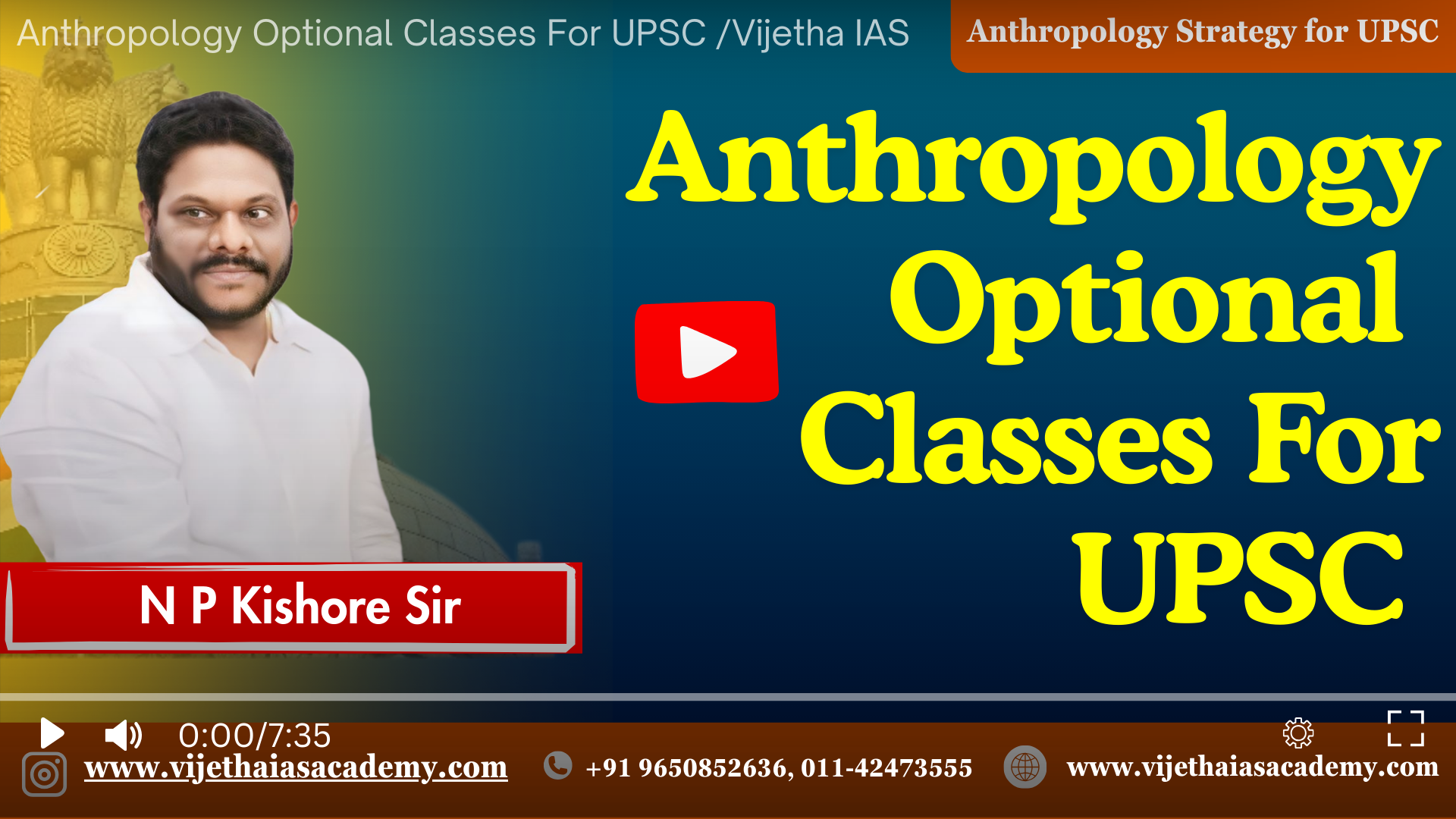
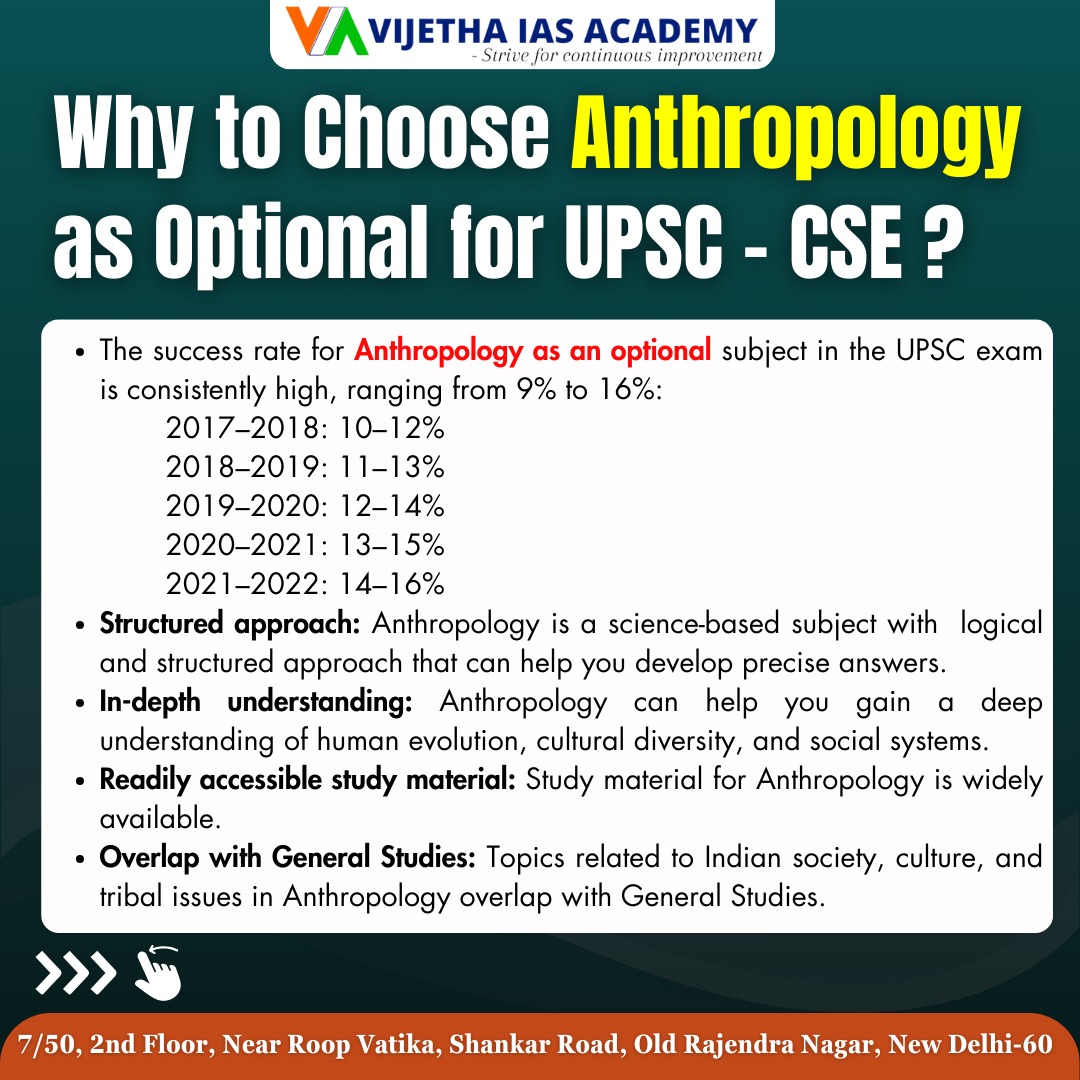
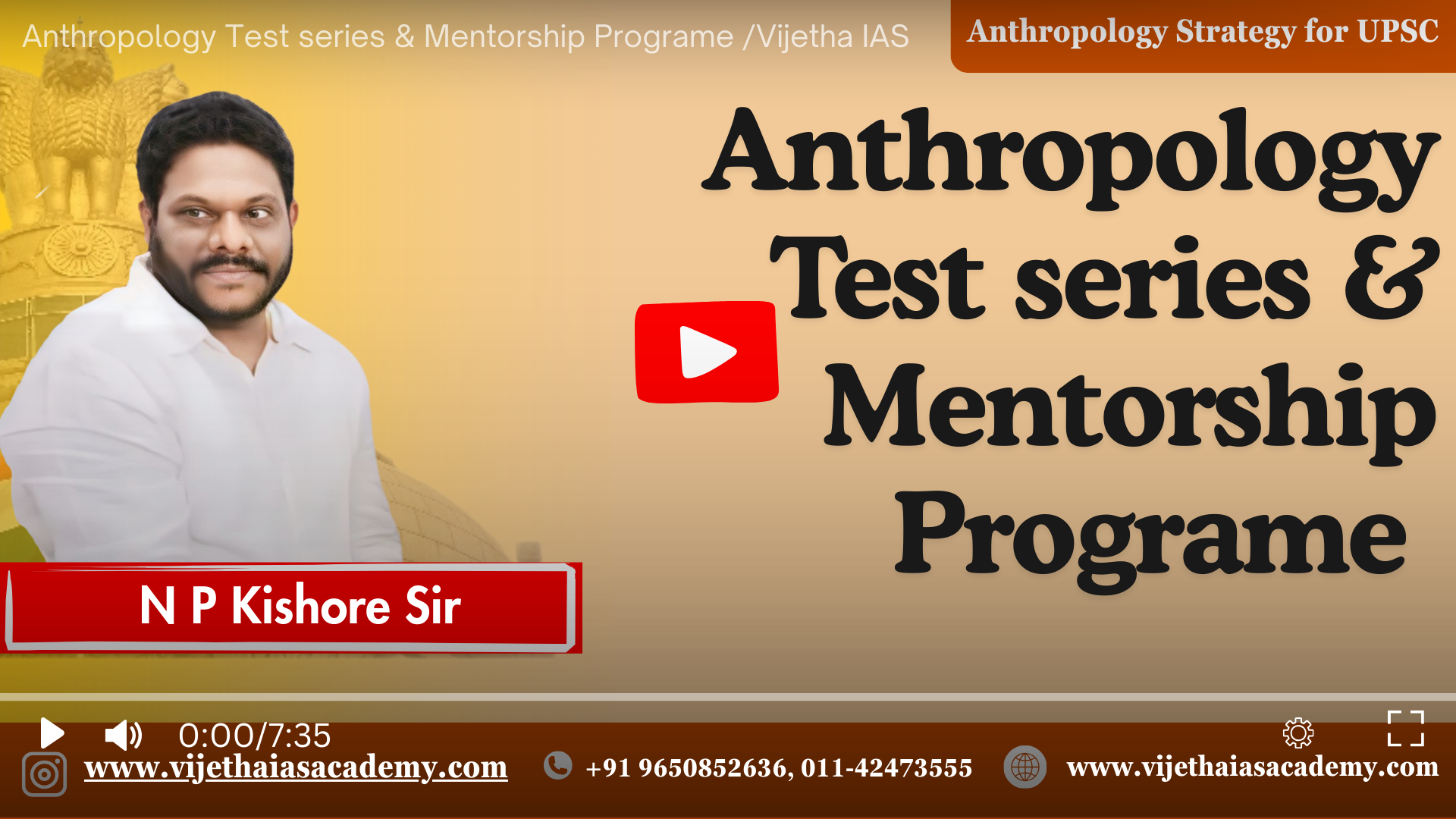
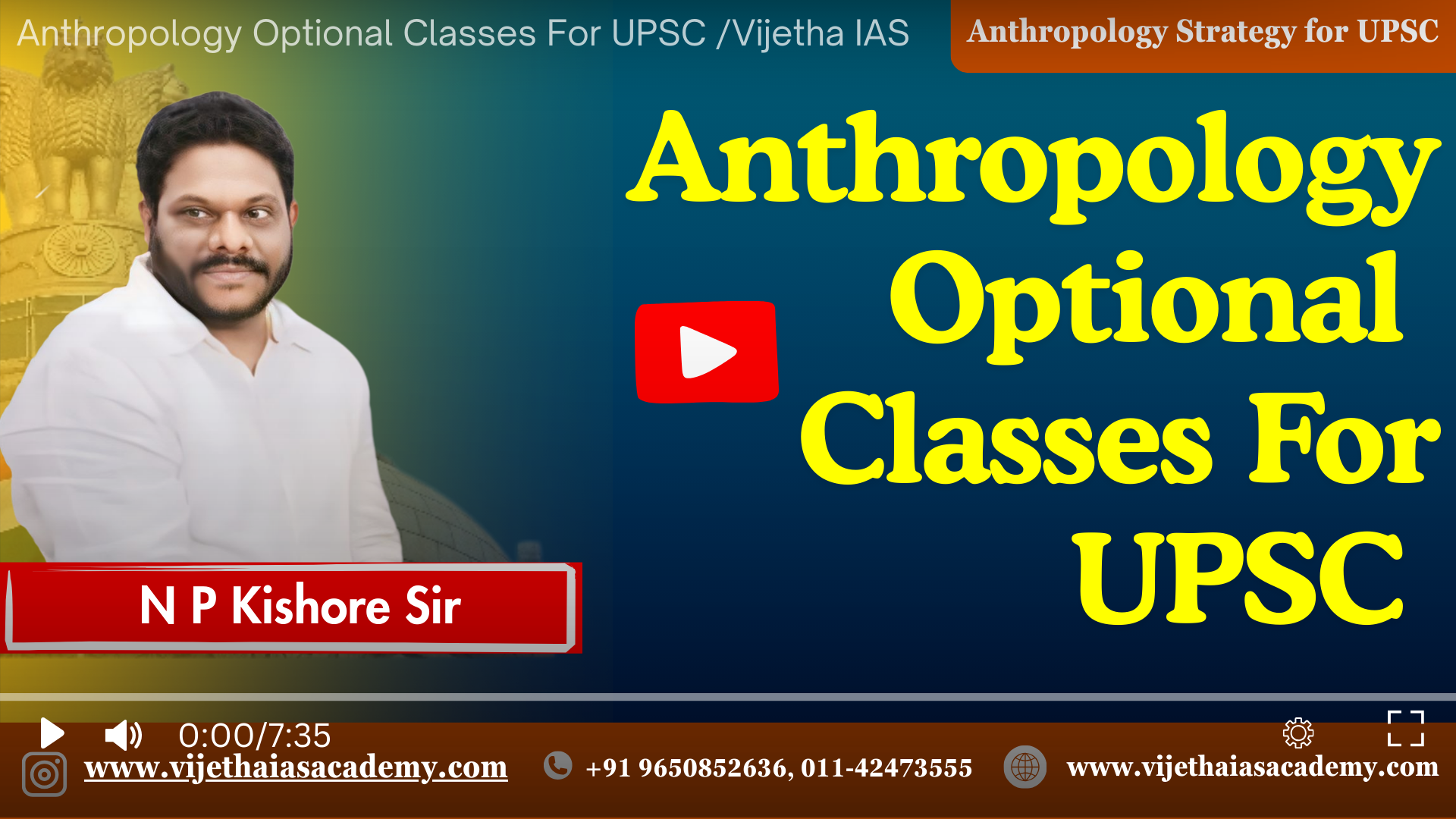
-1731663946320.webp)
